During the Panasonic Z95A tests, we felt as though we were holding a television that deserves to be called one of the best on the market. When it comes to picture quality, it is exceptional! The OLED with infinite contrast, perfect blacks, and incredible brightness makes watching films a pure pleasure. The micro lens array (MLA) truly made a difference. Thanks to it, the picture gained not only in brightness, reaching a spectacular 1500 nits in HDR content but also improved viewing angles - which are already quite good in regular WOLED panels. As a result, every scene looked so realistic that we felt as if we were part of it. We also checked how it performs in various lighting conditions – it impressed without exception in both dark and bright rooms. We couldn't complain about the sound either. The built-in soundbar with Dolby Atmos surprised us with its spaciousness and dynamics, which is usually lacking in speakers integrated with televisions. This is really solid support for cinematic experiences. The Panasonic Z95A does not disappoint gamers either. We tried out its gaming features – support for ALLM, VRR, a 144 Hz panel, and playing in Dolby Vision at 120 Hz are things that every avid gamer will appreciate. Additionally, there are practical extras such as the ability to record to an external disk and a PiP function, which enhance everyday use of the television. Of course, we also noticed some downsides. The Fire TV operating system from Amazon, although better than in older models, still has its flaws. The absence of certain popular apps, such as Player.pl or TVP VOD, and poorly executed translations in the interface can be frustrating at times, especially in a television in this price range. Panasonic Z95A is a television with a capital "P" like premium. It impresses with its image quality, sound, and functionality. However, its high price may deter some, especially when there are devices on the market offering similar capabilities at a much lower price. However, if the budget is not an issue, Z95A is a television that delivers cinematic experiences at absolutely the highest level.
- Matching (Score)
- Our verdict
- TV appearance
- Where to buy
- Contrast and black detail
- HDR effect quality
- Factory color reproduction
- Color reproduction after calibration
- Smoothness of tonal transitions
- Image scaling and smoothness of tonal transitions
- Blur and motion smoothness
- Console compatibility and gaming features
- Input lag
- Compatibility with PC
- Viewing angles
- TV efficiency during daytime
- Details about the matrix
- TV features
- Apps
- Playing files from USB
- Sound
Panasonic Z95A vs SAMSUNG S90F (WOLED)
Direct compare
Z95A
S90FAE

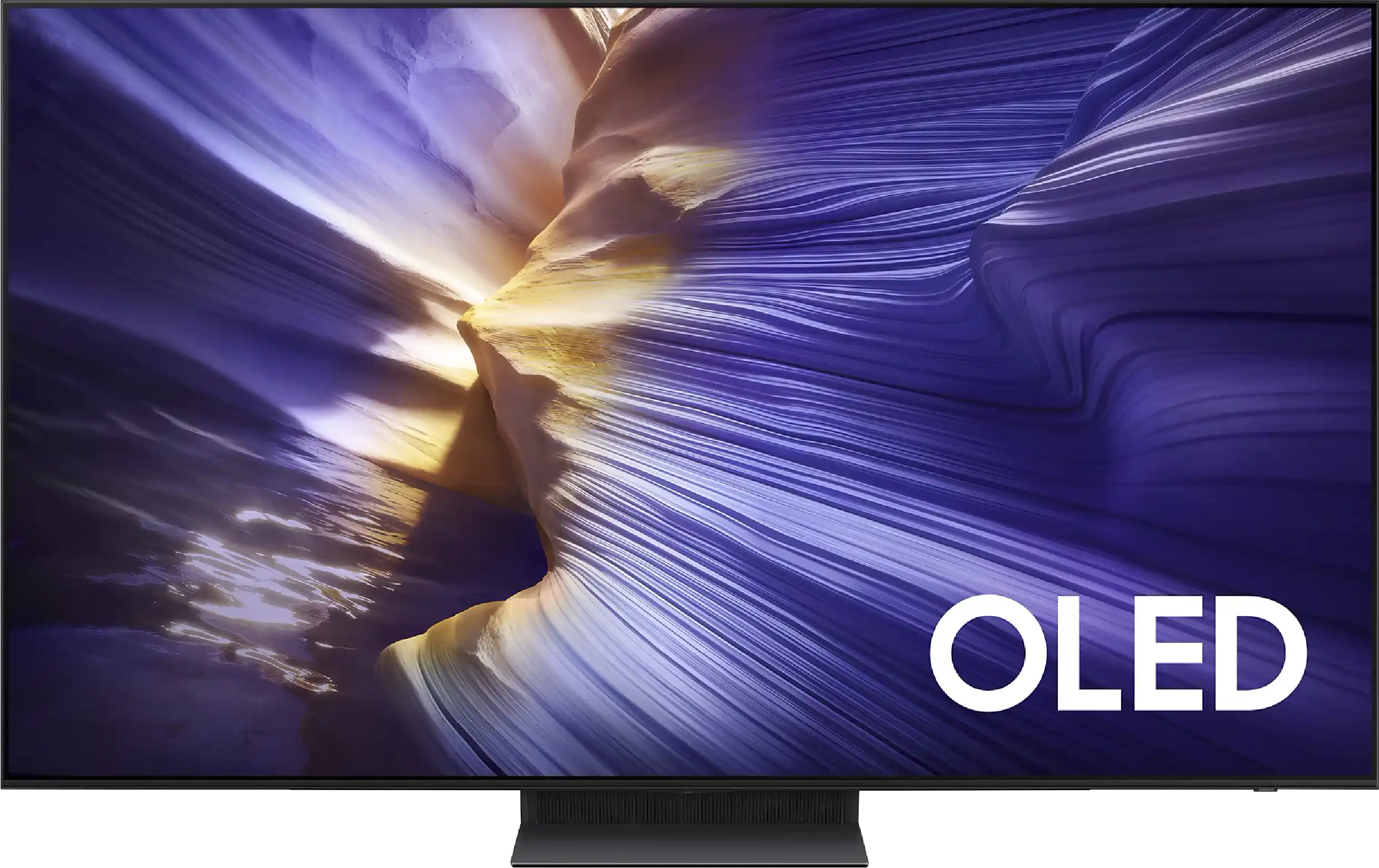
Panel type: WRGB OLED
Resolution: 3840x2160
System: Amazon FireTV
Model year: 2024
Complete the survey to find out the result

Panel type: WRGB OLED
Resolution: 3840x2160
System: Tizen
Model year: 2025
Complete the survey to find out the result

Overall rating
8.3
8.1
Movies and series in UHD quality
8.7
8.3
Classic TV, YouTube
9.0
8.7
Sports broadcasts (TV and apps)
8.9
8.5
Gaming on console
9.6
9.6
TV as a computer monitor
8.6
8.6
Watching in bright light
6.2
6.1
Utility functions
7.4
7.2
Apps
6.1
8.7
Sound quality
8.7
7.4
Complete the survey to find out what fits your preferences
Advantages
Great picture quality: Thanks to OLED technology with MLA, the image offers deep blacks and infinite contrast
Impressive HDR: Brightness of 1760 nits, support for Dolby Vision and HDR10+
Colour reproduction after calibration is truly reference-level
Excellent viewing angles
144 Hz and gaming features: Support for ALLM, VRR
Low input lag
Built-in soundbar with Dolby Atmos: Provides spatial and dynamic sound
Support for user features: Recording to USB, AirPlay, PiP and Miracast
Remarkable black and contrast
High brightness for an OLED TV - 1200 nits peak brightness
Very good motion fluidity - OLED panel 144Hz
Low latency - input lag 5ms
Gaming features: 4x HDMI 2.1, VRR, ALLM, Game Motion Plus, etc.
PiP function and excellent support for external devices with a solar remote
Extended operating system: Tizen
Pleasant sound with a slightly perceptible bass
Disadvantages
Issues with playback of certain formats from USB.
Subtle blending of tonal transitions (performs worse than its predecessor S90D)
Lack of support for DTS:X – an external amplifier is required for full support of this format
Our verdict
The Samsung S90F is an excellent representative of the premium mid-range in the world of OLED televisions. Here we have an organic matrix that guarantees perfect contrast – and no matter how hard LCD manufacturers try with local dimming in Mini LEDs, this black simply cannot be replicated. The S90F showcases its class without any compromises. Compared to last year's model, we get a slightly brighter WOLED panel that, under favourable conditions, can achieve even 1200 nits. This is a result sufficient for comfortable viewing of HDR materials in reference quality for most scenes – especially on streaming platforms such as Netflix. The picture quality here is at a very high level, whether we're watching a film, gaming on a console, or streaming a sports event. In fact, versatility is one of the biggest advantages of this model. With a refresh rate of 144 Hz, very low input lag, and a full set of features for gamers (including working HGiG and the unique Game Motion Plus smoothing), it’s hard to find fault with anything here. The Tizen system performed really well on the S90F. It has its limitations – primarily a closed ecosystem and fewer app options than on Google TV – but if you mainly use the most popular services, this shouldn’t be an issue. A big plus is also the remote control, which can operate most connected devices – even without a numeric keypad. There are also downsides. The built-in media player occasionally has issues with certain formats, and the anti-reflective coating typical of WOLEDs does not handle strong light very well – reflections can be noticeable. We also lack support for DTS and Dolby Vision, but this has been the standard at Samsung that one could expect for years. So is the S90F with a WOLED panel the perfect television? No – but it really isn't missing much. It’s one of the most refined and complete OLEDs in this price range, capable of handling any content, from a series on Netflix, through gaming on a console, to a Sunday match.
TV appearance




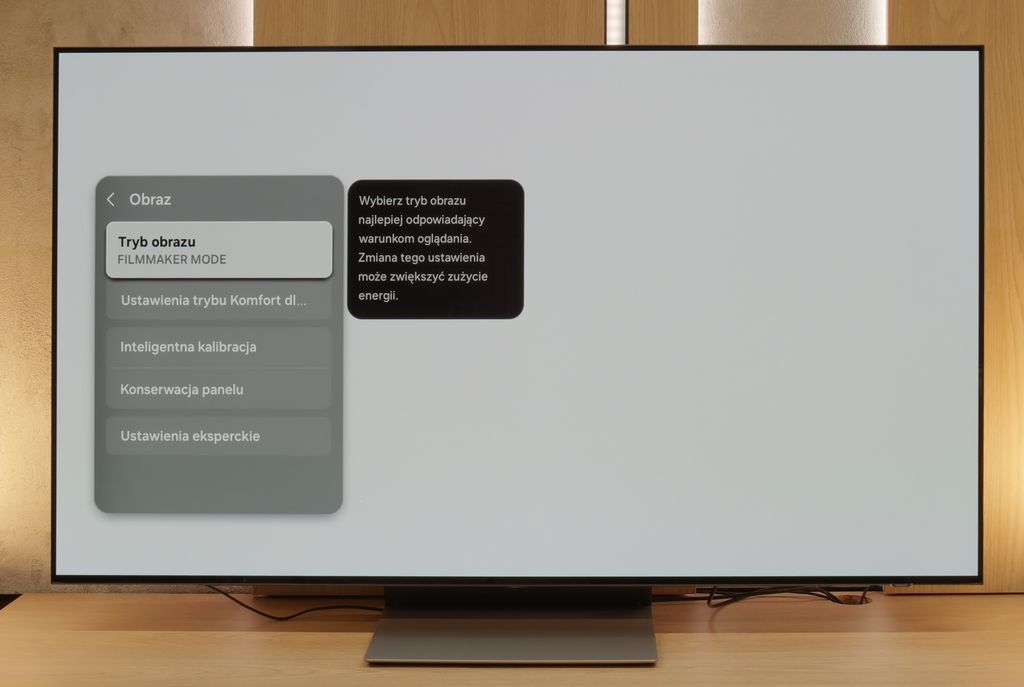
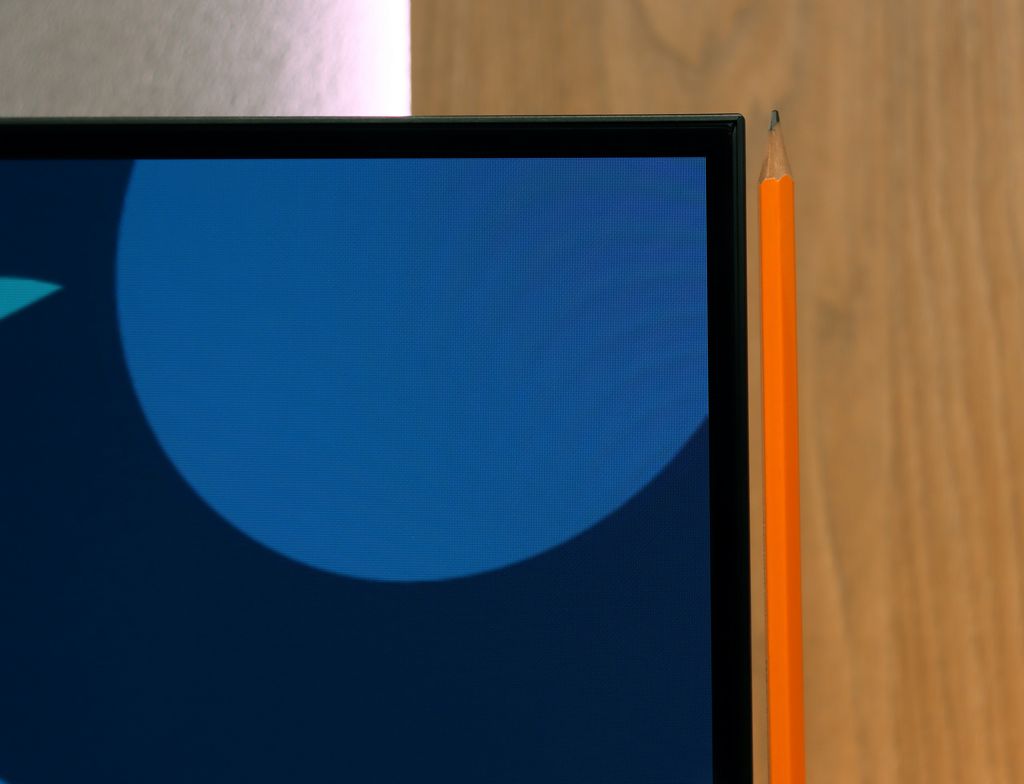
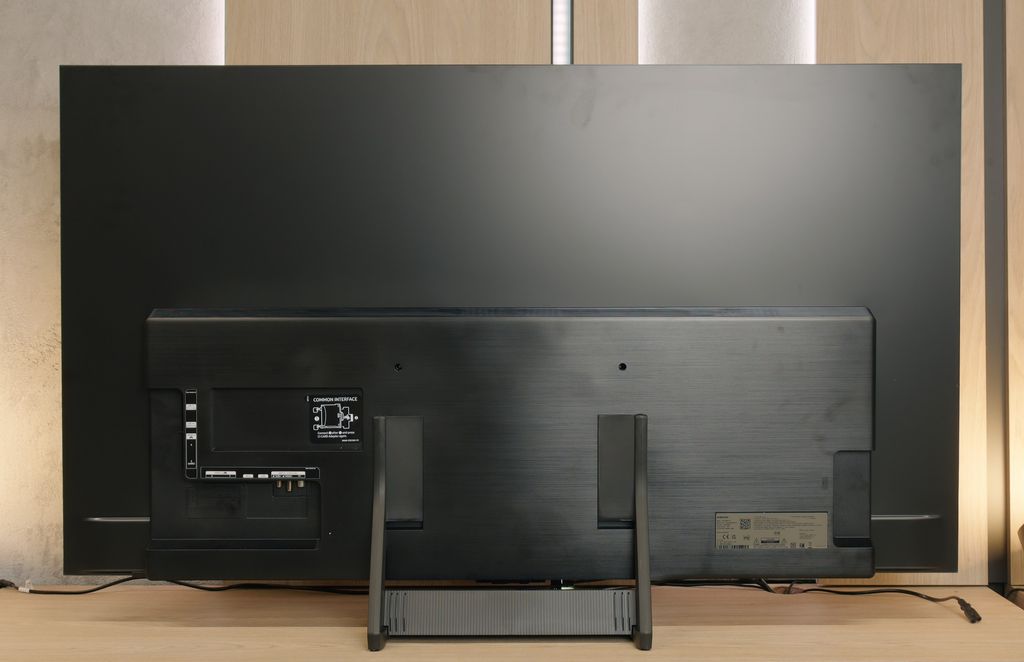
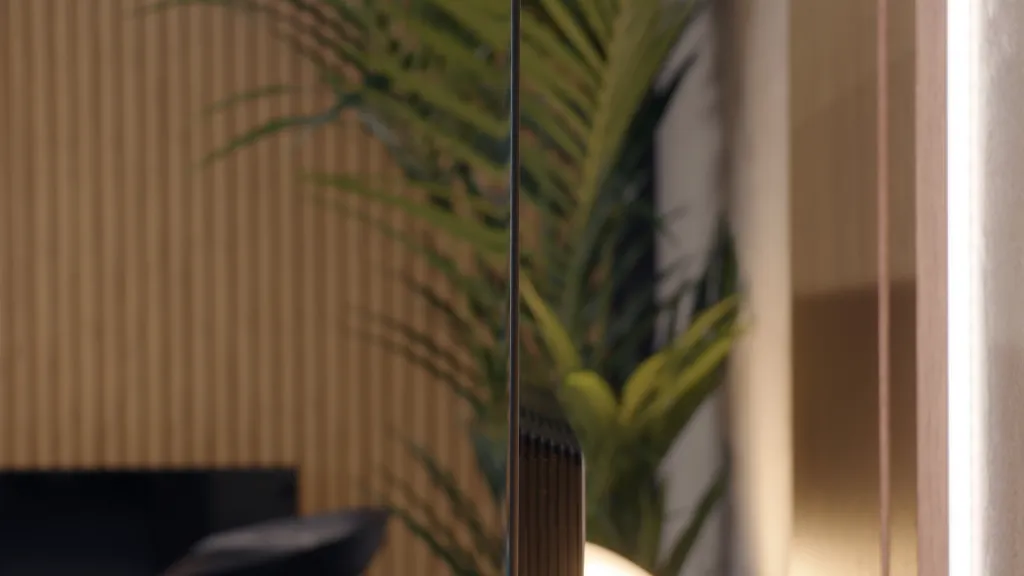
Contrast and black detail
10/10
10/10
Contrast:
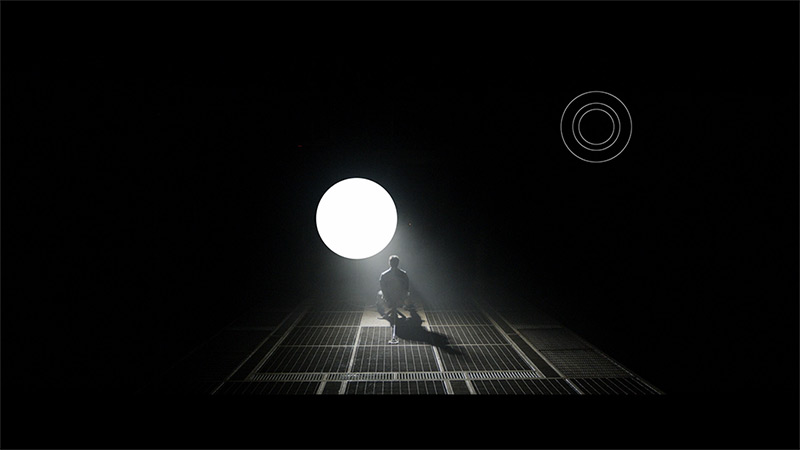
Result
∞:1
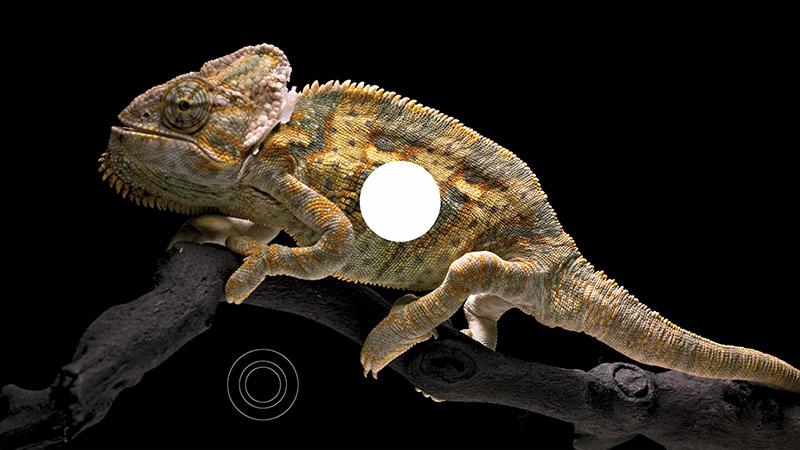
Result
∞:1
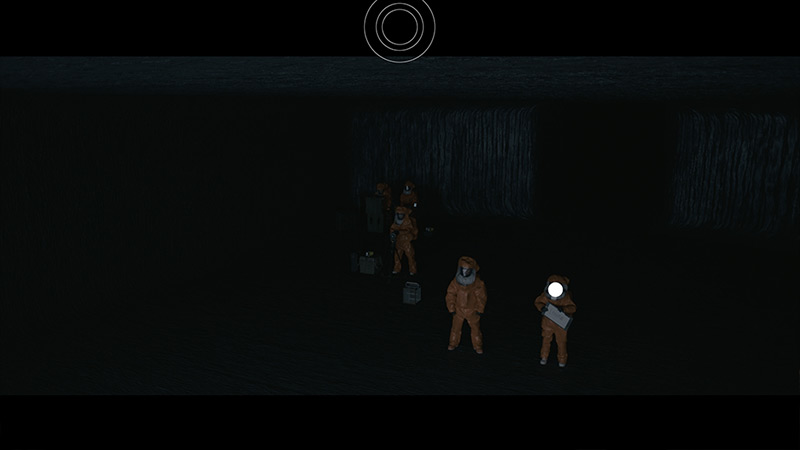
Result
∞:1

Result
∞:1
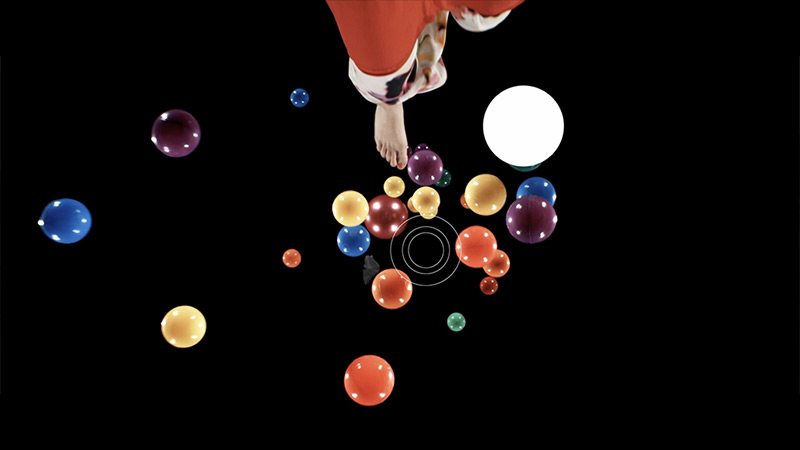
Result
∞:1

Result
∞:1

Result
∞:1

Result
∞:1

Result
∞:1

Result
∞:1
Halo effect and black detail visibility:

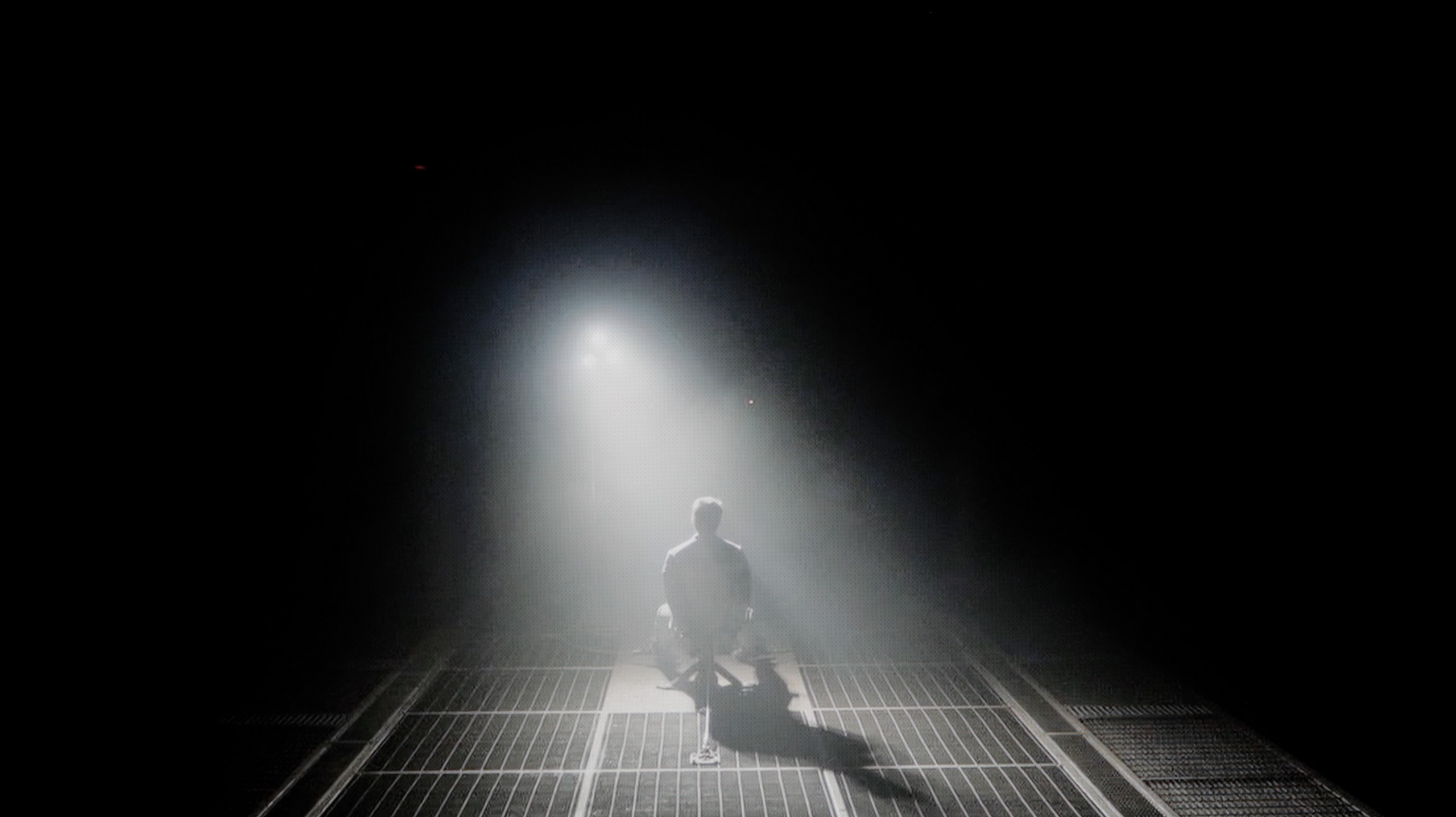
The contrast and black levels in the Panasonic Z95A television are at a level that captures the attention of even the most discerning viewers. The Z95A, as befits an OLED, delivers remarkable results in this area. In every tested scene, the contrast is practically infinite, translating into excellent image quality in real-world conditions. During the screening of the film Oblivion, one can see how light sources, such as lamps, fall on the actor, creating an incredibly realistic effect. The Z95A Panasonic reproduces these black details with impressive precision, making even subtle differences in brightness and lighting stand out clearly. As a result, viewers experience a sense of depth and naturalness in the image that is hard to find in LED televisions, which often offer various types of compromises.
In the case of the Samsung S90F, we have an interesting situation: almost all size variants are equipped with WOLED panels, except for the 65-inch version, which has a QD-OLED panel. In this test, we analyse the version with the WOLED panel produced by LG Display, but the question remains; does this affect the quality of black levels and contrast in this part of the test? In practice – it does not. Regardless of the technology used, both panels can generate perfect black and infinite contrast. This is exactly what we expect from any top-tier television. Watching a series in the evening, in a completely dark room, is pure pleasure. The television easily separates bright elements – such as reflections or background lights – from deep, dark parts of the picture, without creating any halos or brightening effects, which top-of-the-line LCD televisions still struggle with. This is where OLED technology shows its strength – and the S90F is no exception. In terms of black levels and contrast, we cannot fault it at all.
HDR effect quality
8.3/10
7.2/10
Luminance measurements in HDR:

Result
1667 nit

Result
1738 nit
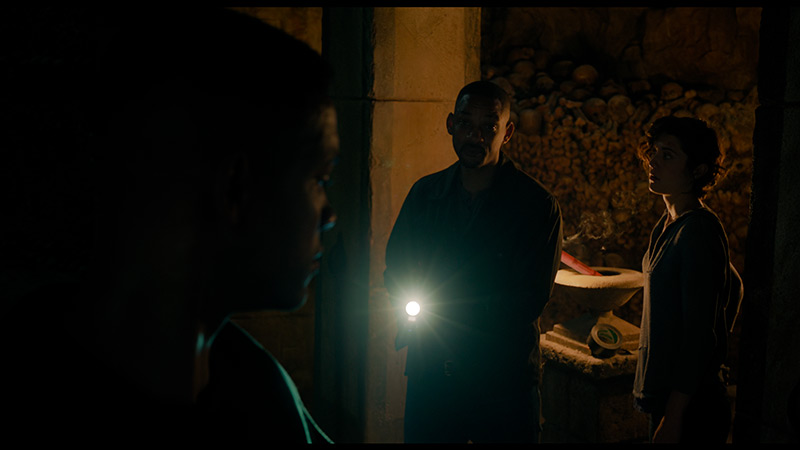
Result
1792 nit
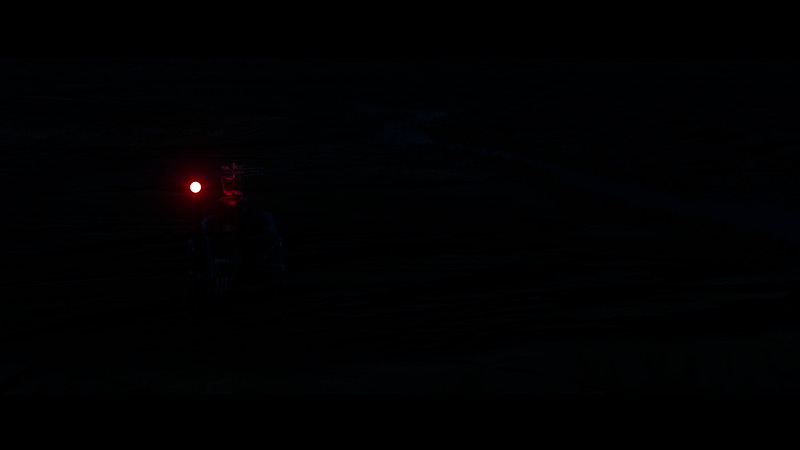
Result
1798 nit

Result
999 nit

Result
1099 nit

Result
1177 nit

Result
1252 nit

Result
1183 nit

Result
577 nit
Scene from the movie “Pan” (about 2800 nits)


Scene from the movie “Billy Lynn” (about 1100 nits)


Static HDR10


Dynamic: Dolby Vision
Dynamic: HDR10+


HDR luminance chart:
SAMSUNG S90F (WOLED)
Luminancja HDR
Luminance of RGB colors
Panasonic Z95A
Luminancja HDR
Luminance of RGB colors
Panasonic Z95A showcases class when it comes to HDR performance. In luminance tests, it achieves a level of 1800 nits, which has a real impact on movie watching. Scenes from Life of Pi or Gemini Man look fantastic – the television effortlessly renders details and intensity of bright spots, impressing with its power. In more demanding moments, like the final scene from The Meg, one can see how bright light floods the screen. In such moments, brightness drops, which is typical for organic matrices. Nevertheless, a result around 1000 nits can still be considered excellent, still providing very good image quality. Additionally, the television offers excellent coverage of wide colour palettes – as much as 98.6% for DCI-P3 and 74.5% for BT.2020. Thanks to this, colours are not only vivid but also deeply saturated, allowing for a full appreciation of the richness of details, especially in HDR scenes. Such coverage makes the hues look more realistic, and the HDR effect gains in intensity and accuracy. All this impressive HDR effect is thanks to MLA technology, which enables achieving such high luminance and excellent image detail. Because of this, the Panasonic Z95A offers HDR at a level that truly makes a difference.
Does the S90F handle not only black, but also bright parts of the image? Definitely yes. Tales of OLEDs as “dark screens” can slowly be regarded as a myth. The Samsung S90F, like the LG C5 based on a very similar panel, achieves brightness exceeding 1000 nits. This is a value entirely sufficient to enjoy impressive and dynamic HDR imagery – both in films and series. Most of the scenes we tested look superb, with well-defined highlights and high contrast. Of course, OLED technology still has its limitations – in very bright, full-screen sequences, such as the test pattern from the film The Meg (picture 5), the television may noticeably dim the image. However, it should be emphasized that such scenes are rare. It can be considered that the HDR effect is good enough that even mid-range OLED models like the S90F can provide a cinematic experience in the home living room.
Factory color reproduction
8.3/10
7/10


Factory Mode
After calibration


Factory Mode
After calibration
The best picture mode on the Panasonic Z95A is undoubtedly the Filmmaker mode. It offers quite a good image reproduction, but it is not free from certain issues that require improvement. Firstly, the white balance, for both 4K and HD content, tends to have a dominance of red and blue hues. This causes a slight pinkish tint to the image, particularly noticeable in bright, white scenes. Such deviations can be seen in the comparative photo below, which illustrates this issue well. The Colour Checker test also confirms these discrepancies, showing slight shifts in the dots towards the mentioned shades.
In terms of gamma brightness characteristics, it performs very well, with only minor problems when brightening small details. A greater challenge is posed by the EOTF curve, which is responsible for controlling brightness in 4K HDR content. Here, there is a slight boost in brightness above the reference value, which sometimes makes the image too bright, especially in more demanding scenes. Although the Filmmaker mode is definitely the best choice on the Z95A, these aspects require refinement to fully utilise the television's potential.
The Samsung S90F, like most modern televisions, offers many picture modes, but – in line with our testing tradition – we assessed it in the best one, which is the Filmmaker mode. This way, the image looks significantly more natural than in the default, often oversaturated settings. It was neither overly saturated nor artificially muted – just closer to what should be seen. Of course, "more correct" does not mean "ideal". Unfortunately, our S90F unit had considerable issues with white balance, especially in the blue range, resulting in a slightly yellowish filter being applied to most scenes. Someone might say it looks more "cinematic" – because it is warmer – but let's not kid ourselves, George Lucas did not film Star Wars in sepia 😉 (you will find the comparison with the scene as always below).
Additionally, in HDR materials, there was a noticeable issue with brightness management. The EOTF curve showed a clear "spike" in brightness – the television brightened the image more than it should have, which made some effects look overly intense and diverged from the reference. Fortunately, some of these problems can be eliminated through professional calibration – you will read about its effects later in the review.
Color reproduction after calibration
9.4/10
9.2/10

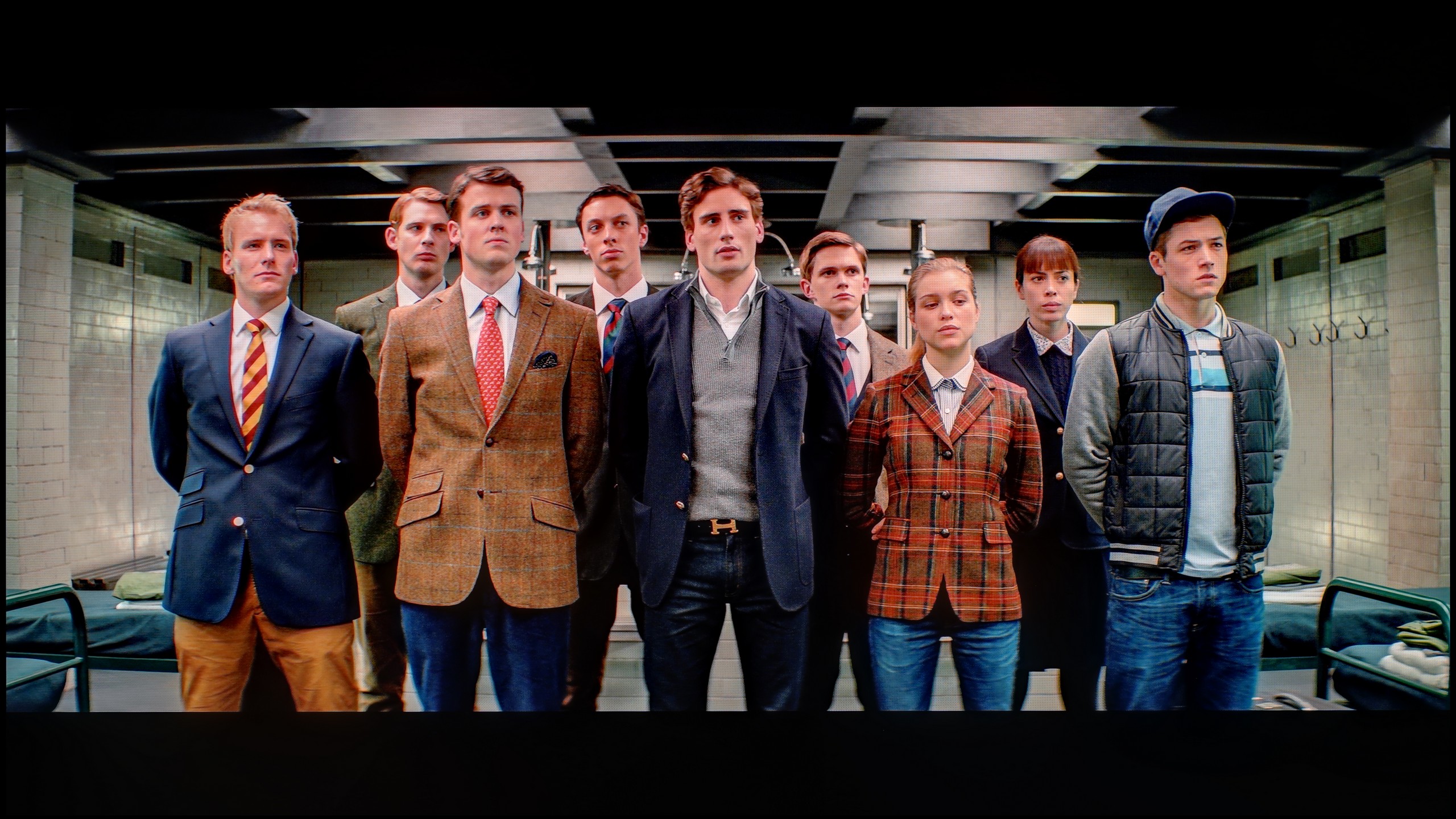


After calibration, Panasonic Z95A shows its full potential, offering an almost perfect picture. The television provides immense adjustment capabilities, which we have fully utilised. The white balance after calibration is positively perfect, and errors in SDR content at the level of 0.5 place it in an absolutely reference standard. The same is true for 4K HDR content – the screen tint has been completely eliminated, and the white balance is now exemplary.
The colour palette and Colour Checker test confirm the excellence of the calibration. Errors below 2 are a result that will satisfy both professional calibrators and enthusiasts of cinematic picture quality. Significant changes have also occurred in the brightness characteristic – the EOTF curve has been flattened, eliminating previous issues with excessive brightness. And a small gamma error has been reduced.
Before calibration, the picture was decent, but now it's an entirely different league. It's a real feast for the eyes, the quality of which is hard to compare to anything else. Panasonic Z95A, after fine-tuning the settings, becomes a true master of colour reproduction.
After calibration, we managed to eliminate practically all the previously mentioned errors. Older films in SDR quality finally look as they should – without the sepia effect or artificial aging of the image. The atmosphere of the classics returns to its rightful place (you’re welcome, Star Wars fans), and the colours no longer resemble an Instagram filter.
One of the key changes was also the improvement of brightness characteristics in HDR content. We managed to control the EOTF curve in almost a reference manner. Yes, the most demanding users may spot minimal deviations in brightness, but honestly – most viewers won’t even notice that. And it's no wonder, because the vast majority of errors are below a ΔE value of 3, which is below the threshold of visibility. After calibration, the S90F (WOLED) truly becomes an excellent display – one that provides nearly perfect picture quality.
Smoothness of tonal transitions
6.5/10
7.3/10

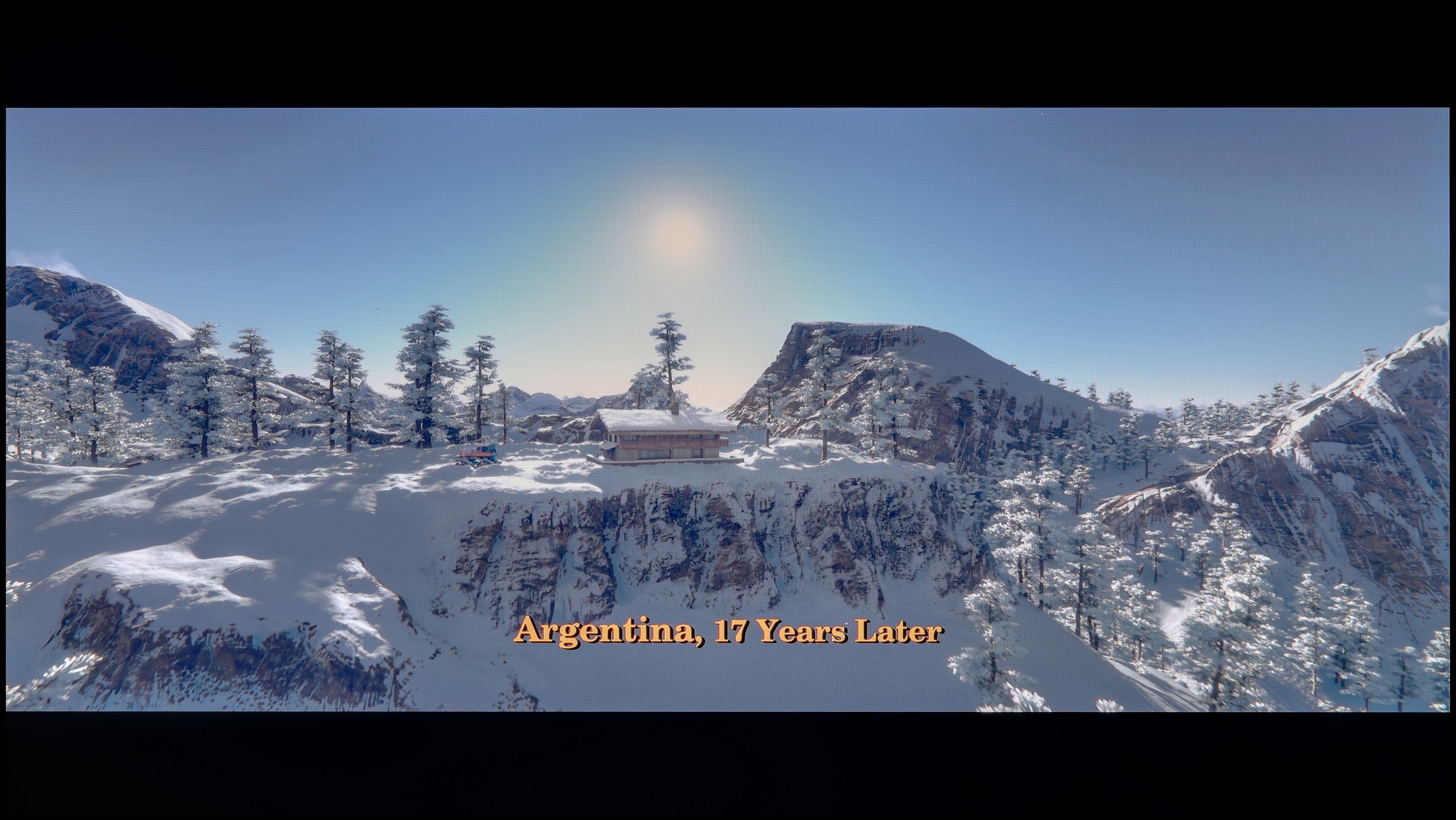





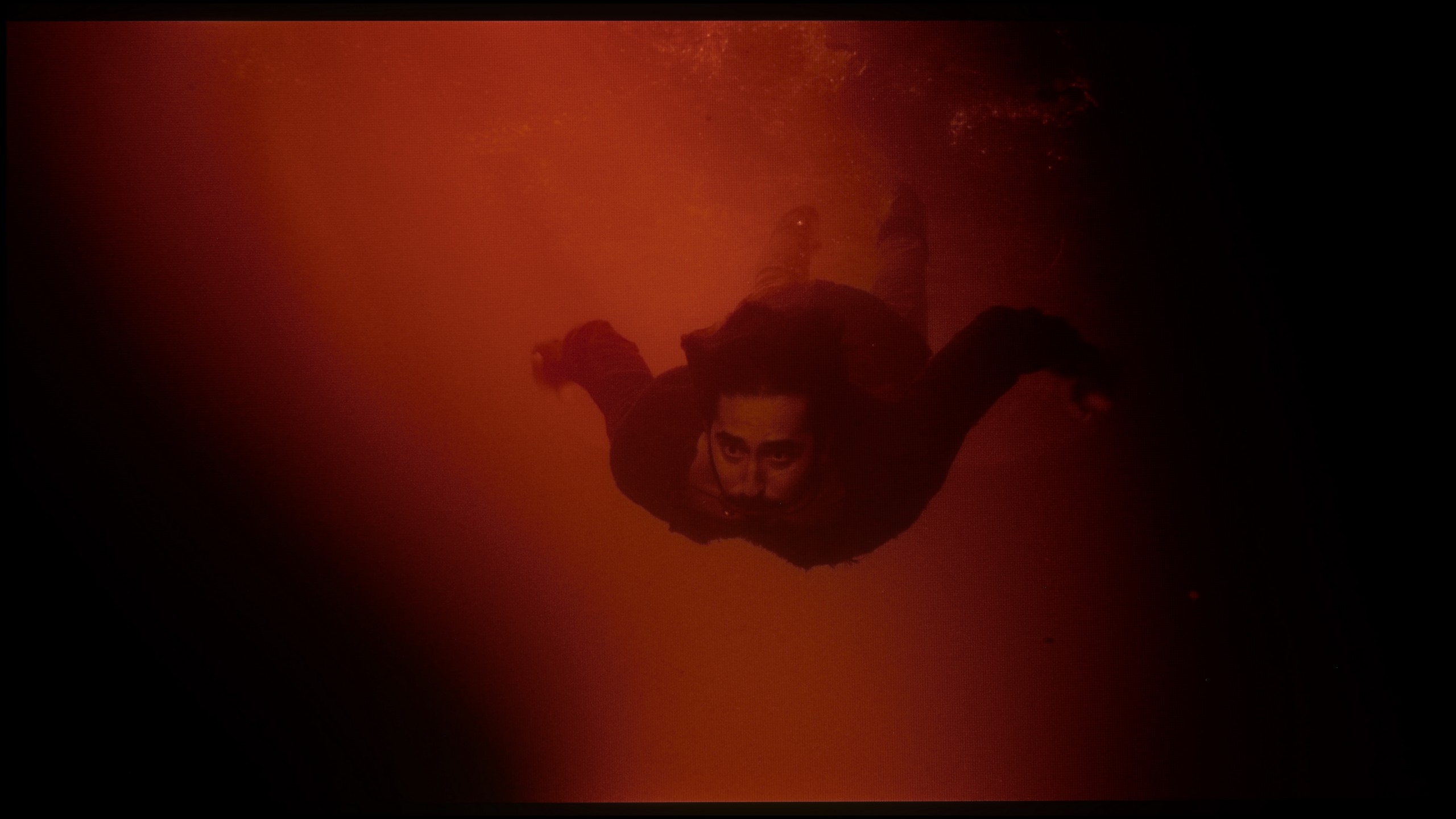




The tonal transitions in Panasonic Z95A are not disastrous, but in this class of devices, one can expect more. The television struggles with smoothly blending colours, both in dark and light shades. In more demanding scenes, minor imperfections are visible, which can affect the visual experience, particularly for more discerning users. While this is not a disqualifying factor, it is an aspect that needs improvement, especially considering the price and ambitions of this model.
And here we must honestly admit – the S90F has somewhat let us down. Compared to last year's S90D model with a WOLED panel (very similar to the one used this year), this year's Samsung has performed worse. This is not only in comparison to its main competitor, the LG C5, but even when put alongside its older sibling. The biggest problems arise in dark scenes, where difficulties with smoothly blending colours are evident – the screen slightly stepped the tonal transitions, causing some parts to lose their naturalness. We don’t know exactly what went wrong – perhaps it’s a matter of software or a different processing algorithm. It's a pity, as we were hoping that the level from last year would be at least maintained. Unfortunately, it is a step backwards.
Image scaling and smoothness of tonal transitions
7.4/10
7.5/10
Smooth transition function

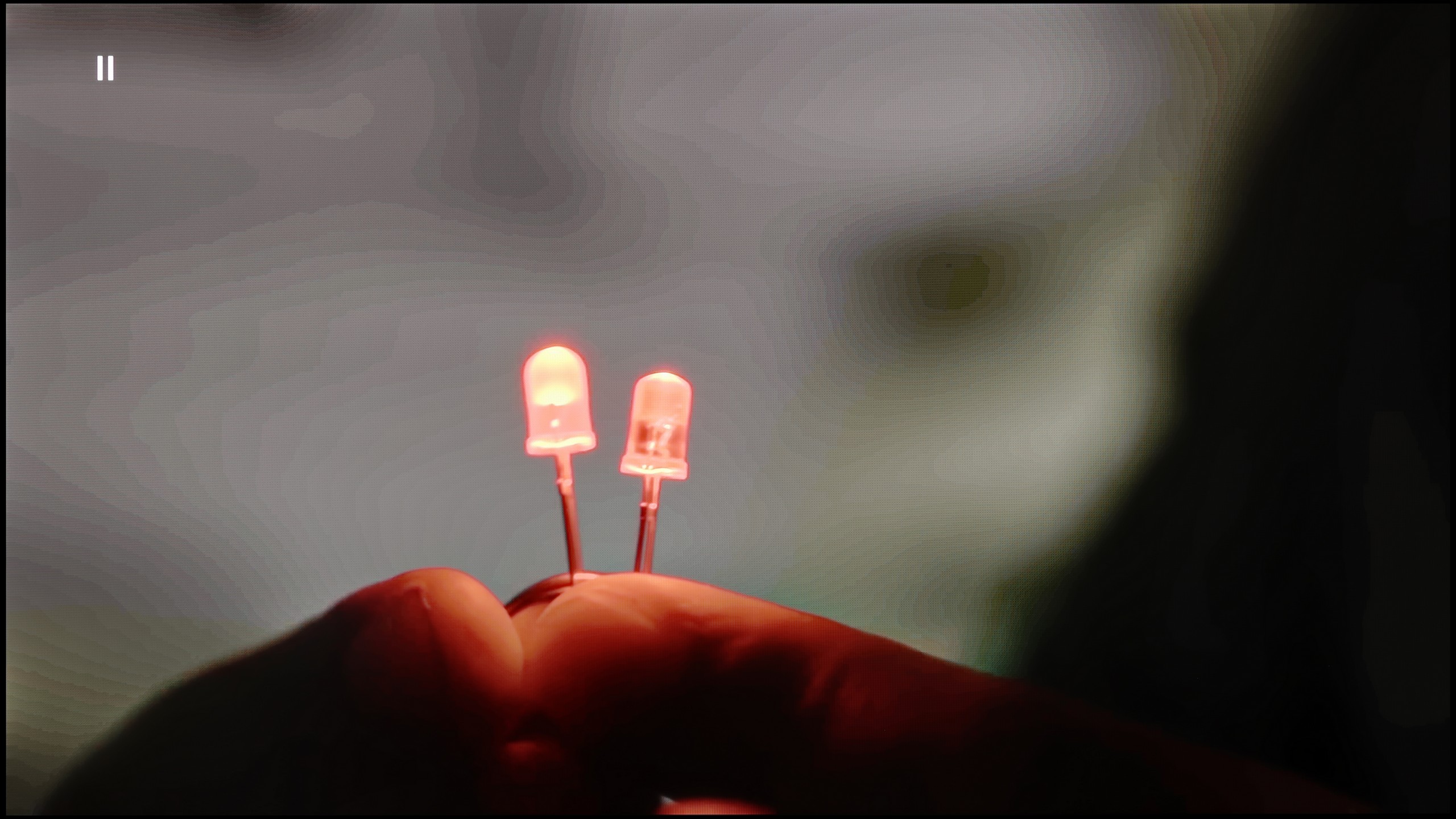
Image without overscan on the SD signal


In the case of lower quality materials, the function "Gradation Smoothing" is responsible for smoothing tonal transitions. The best results are achieved with an intermediate setting – although they are not spectacular, the function works correctly and does not introduce unwanted effects into the image. It can be rated as average, but sufficient to improve the quality of tonal transitions.
As for digital processing, or upscaling, the image looks surprisingly good. It is vivid and pleasant to the eye, which makes lower quality content, such as standard television or YouTube, look quite decent. However, minor issues can be noted, such as "jagged" edges, for example, branches in the background. Nevertheless, this does not significantly affect the overall viewing experience, and the television handles these materials in an acceptable manner.
Digital Image Processing in the S90F:
Fortunately, Samsung, as in most of its models, effectively manages the unwanted posterisation effect in the S90F. The feature responsible for this aspect is noise reduction, which does a decent job of smoothing tonal transitions and eliminating unnatural colour connections – of course, within its limitations. Unfortunately, it operates rather aggressively, so using it comes with compromises. In addition to improving gradation, it can also remove film grain or gently soften facial features. In this case, the choice is yours – do you prefer a more "clean" image, or do you want to preserve the original texture of the material?
Image Scaling in the S90F:
In this year's model, Samsung implemented its own AI processor – NQ4 Gen3, which does quite well with upscaling. In our test scenes, the television effectively "pulled up" lower quality towards artificial 4K – the image was more pleasant to view, and the differences in sharpness between native and scaled content were minimal. Unfortunately, behind all this AI marketing facade lies a certain shortcoming. The S90F struggles with overscan. If you reach for truly archival materials – e.g. a VHS tape of your parents' wedding – you must expect that the lower part of the image may be cut off. The image adaptation function to resolution simply does not work here as it should.
Blur and motion smoothness
8.5/10
8.5/10

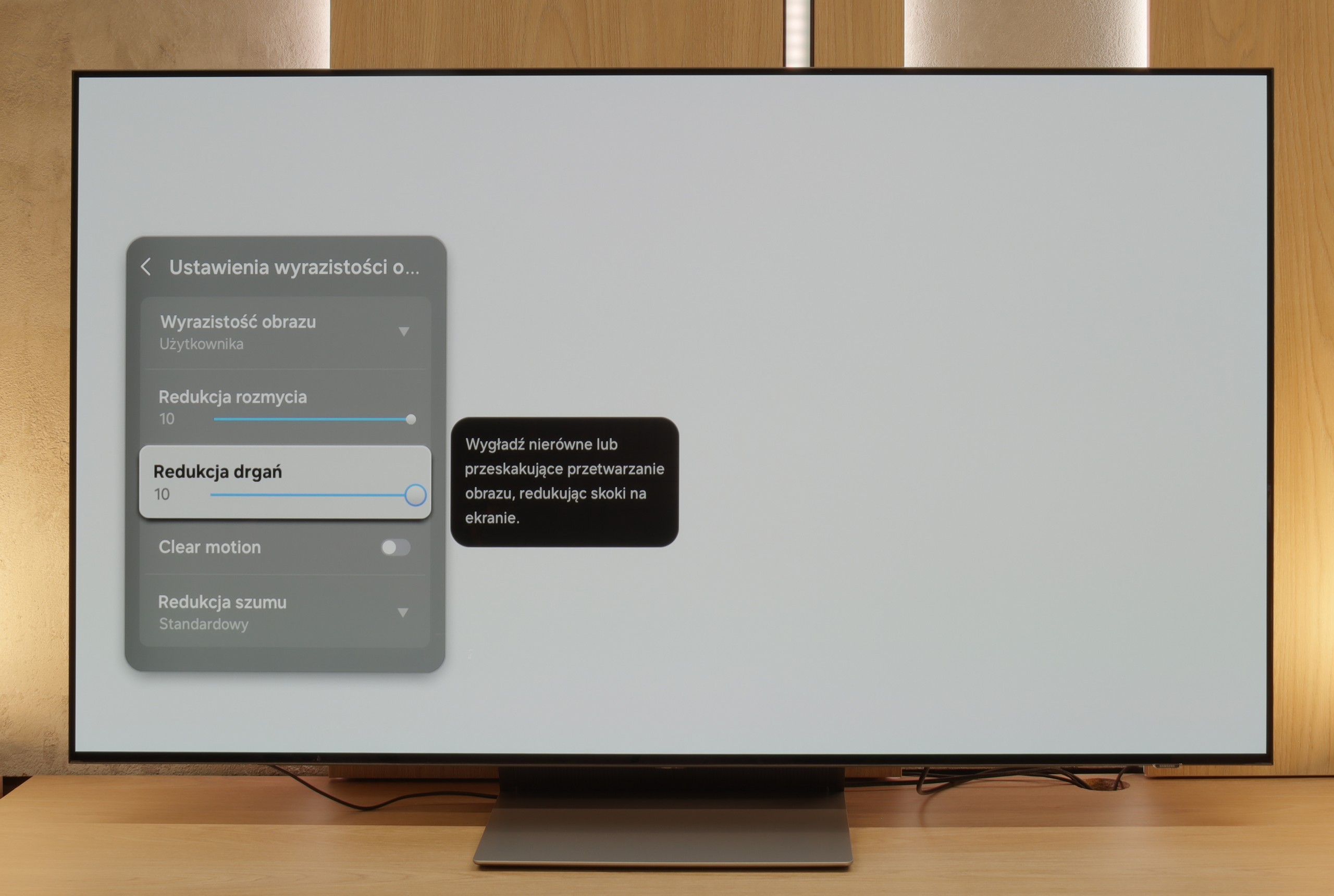
Blur (native resolution, maximum refresh rate):






Blur (BFI function enabled):
Image flickers in this mode



Image flickers in this mode
Panasonic Z95A, thanks to its 144 Hz panel, offers excellent image fluidity. For films, there is an "Intelligent Frame Creation" feature that enhances fluidity and reduces motion blur. The user has two sliders at their disposal: "Motion Blur Reduction" – responsible for clearer and sharper details in rapidly moving scenes. "Film Smoothness" – adds fluidity by creating additional frames between the originals, making motion appear smoother and more natural with a "soap opera" effect.
Thanks to this, viewers can adjust the settings to their own preferences. Films and less dynamic material look smooth and natural, which should satisfy most users.
The S90F really handles motion excellently – after all, it’s an OLED with a 144 Hz panel, so sports and games look absolutely stunning on it. The image is fluid, clear, and there’s no room for any ghosting or blurring that sometimes plagues cheaper LCDs.
The television is also equipped with motion smoothness settings, allowing you to customise everything to your preference. We have motion blur reduction and judder reduction – you can set it so that the image is super smooth (even to that soap opera effect), or more cinematic, with the classic 24-frame 'choppiness'. The choice is yours; Samsung doesn’t impose anything.
Console compatibility and gaming features
10/10
9.5/10
- ALLM
- VRR
- VRR range40 - 144Hz48 - 144Hz
- Dolby Vision Game Mode
- Correct implementation of HGIG
- 1080p@120Hz
- 1440p@120Hz
- 4K@120Hz
- Game bar

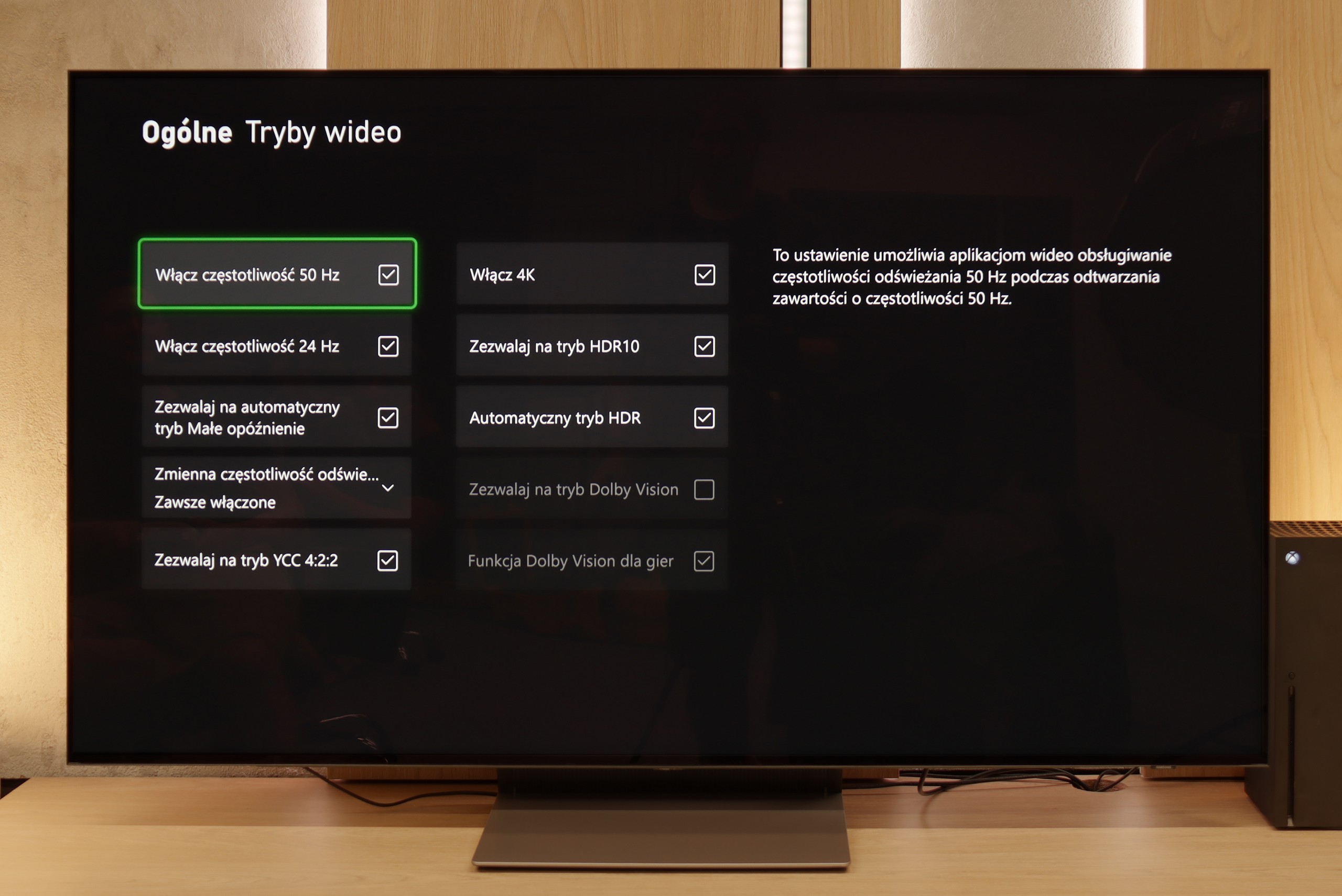

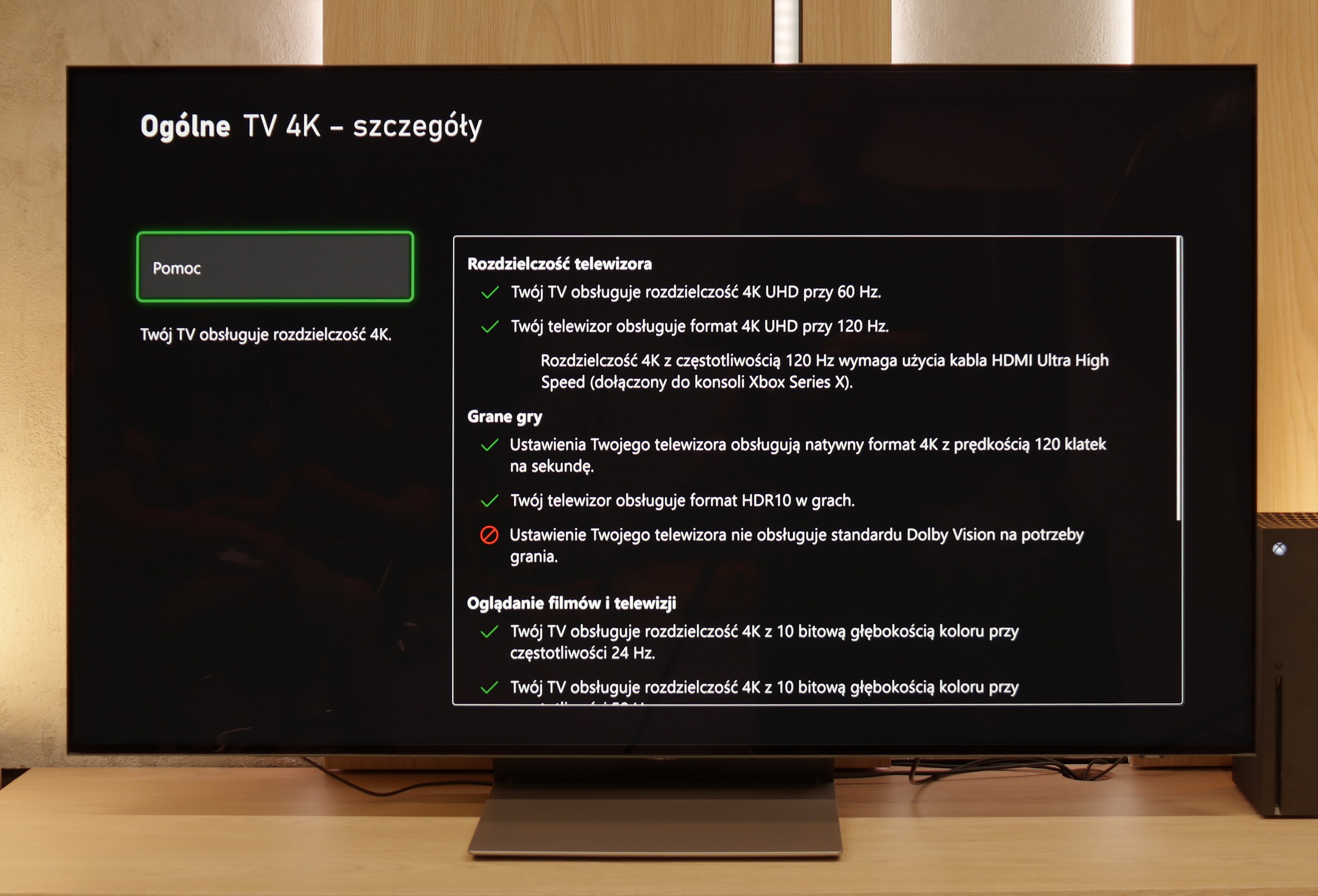

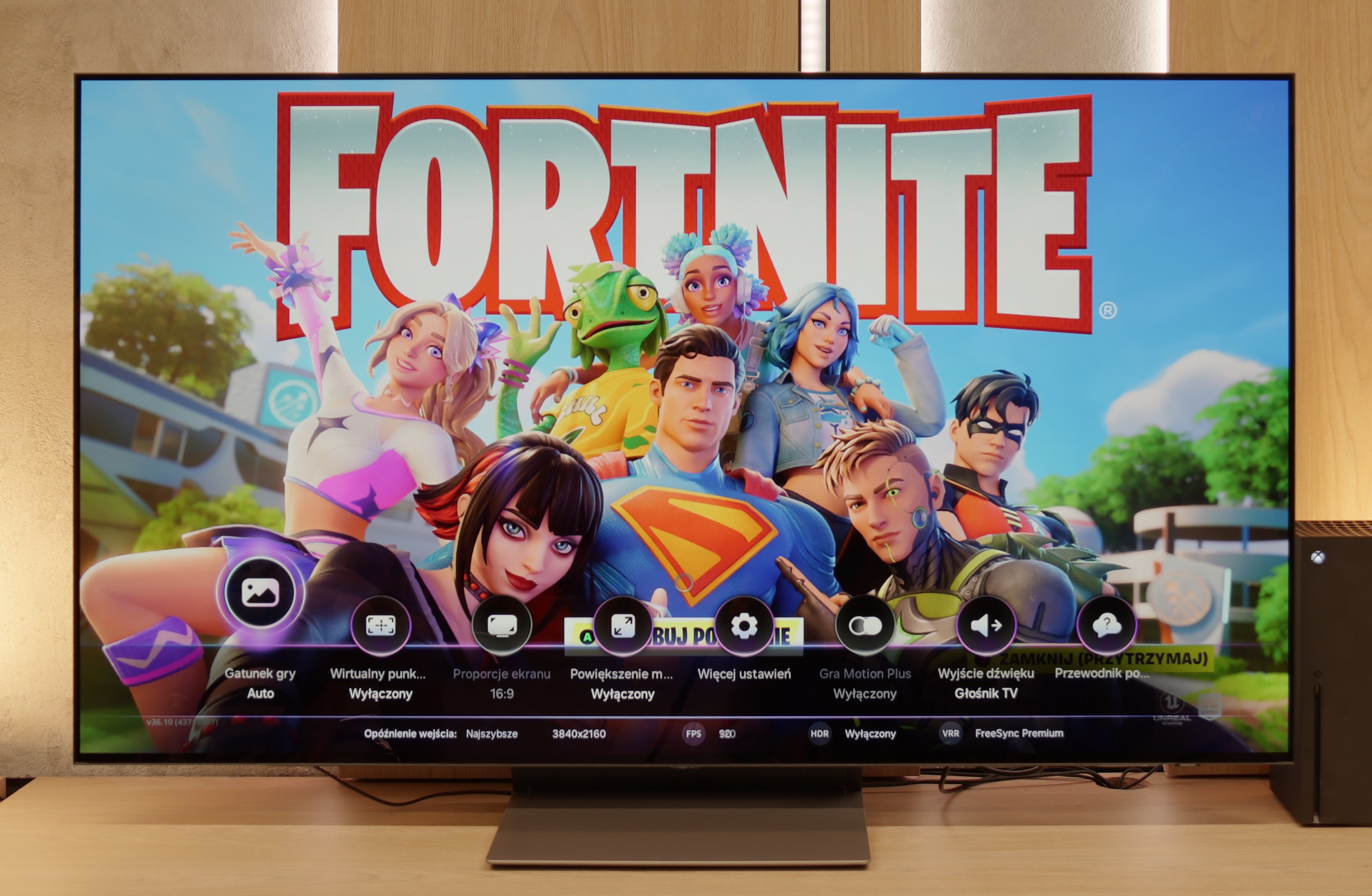

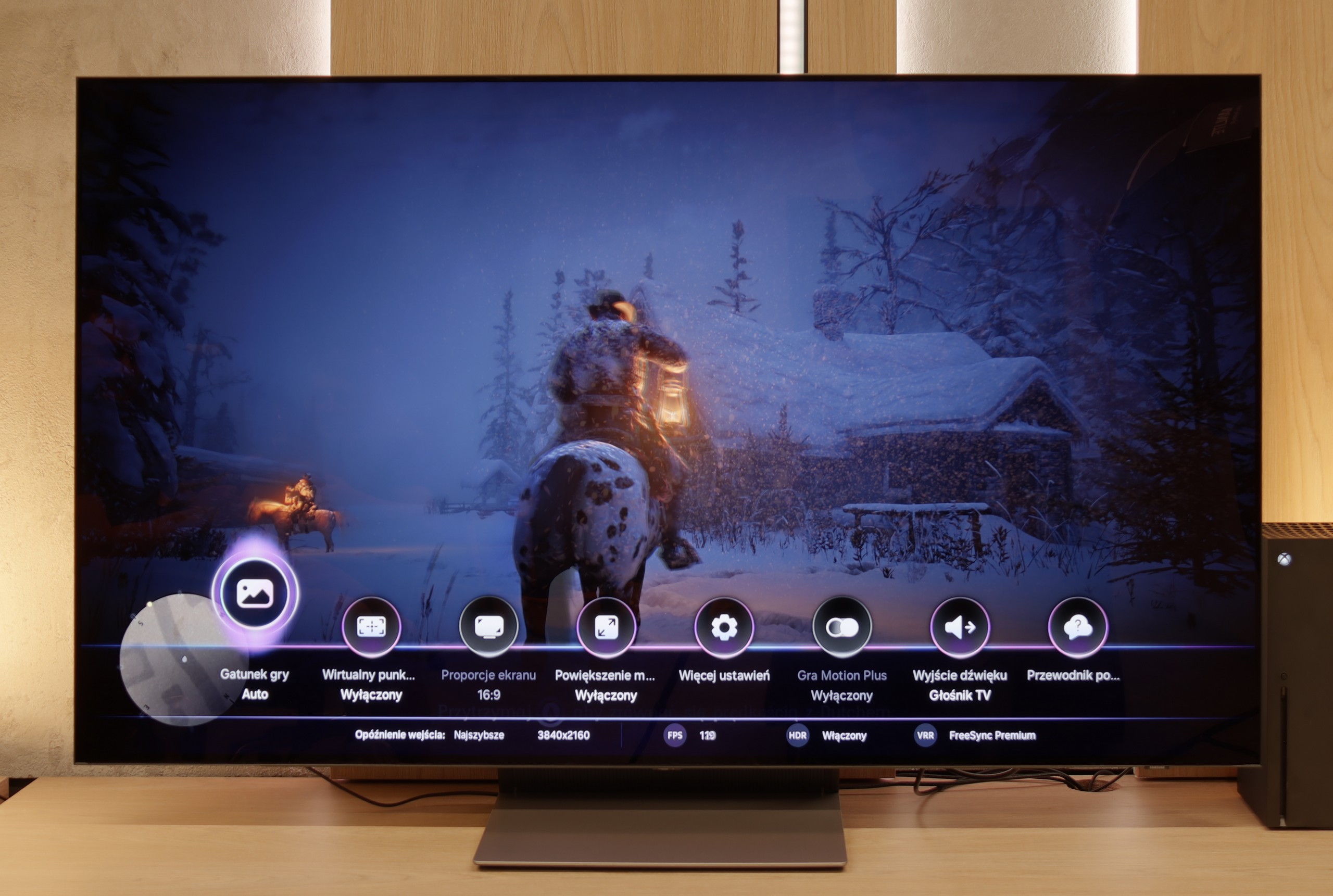
Panasonic Z95A this year shows that the manufacturer has made a huge leap forward in terms of support for gamers. The television offers virtually everything one could expect from a device in this bracket. Support for ALLM (automatic low latency mode) and VRR (variable refresh rate) ensures smoothness and eliminates tearing in dynamic games. The 144 Hz panel allows for incredible fluidity, and additional support for resolutions other than 4K provides greater flexibility, which is a significant advantage for gamers using various configurations.
A unique and quite specific feature is the "Game Bar." Its ball-shaped interface stands out from the competition and allows for quick adjustments of key settings such as VRR, brightness level, or picture mode, without having to interrupt gameplay.
However, in this class of device, there is a minor disappointment – the Panasonic Z95A offers only two HDMI 2.1 ports, instead of four. This is definitely too few for a premium television, especially at a time when many people own more than one device requiring full HDMI 2.1 support, such as a next-gen console or an advanced computer. In this category, it's hard to accept this limitation, especially given the high aspirations of this model. Nevertheless, the television is an excellent choice for gamers, offering versatility and functionality at the highest level.
When it comes to gaming features – the S90F has absolutely nothing to fault. Aside from the lack of Dolby Vision, which is already the norm for Samsung. The television operates at 144 Hz, has four HDMI 2.1 ports, so you can easily connect more than one console or PC. Onboard, we also find the Game Bar – a practical tool that allows you to quickly glance at picture settings, VRR status, ALLM mode, and other useful options. Game Motion Plus also deserves a mention – Samsung's proprietary motion enhancer that is the only one truly functioning sensibly in games. The image appears smoother, but without any artificial effects or slowdowns.
It is also worth mentioning the HGiG feature, which – much to our slight surprise – works correctly. We're mentioning this because Samsung clearly broke something in one of the last updates, and in some models, the option responsible for HGiG simply... disappears from the menu. Setting it up becomes practically impossible. Fortunately, our S90F unit did not have this issue, but the situation is dynamic, so it's worth keeping this in mind and regularly checking for updates and information from the manufacturer.
Input lag
10/10
10/10
SDR
HDR
Dolby Vision
Panasonic Z95A delights with an exceptional level of input lag, making it one of the best choices for gamers in its class. Regardless of the mode, the television achieves results of around 13 ms at 60 Hz and just 5 ms at 120 Hz, ensuring incredibly smooth and responsive gameplay. Moreover, Panasonic allows playing in Dolby Vision mode with minimal delays. Well done!
The input lag on the S90F is at a level akin to that of a monitor. In optimal conditions, a result of 5 ms was achieved, which is an absolutely stunning outcome – even a benchmark for the most demanding players. Whether you are playing fast-paced shooters, fighting games, or simply value instant response – the S90F does not disappoint in this regard at all.
Compatibility with PC
8.6/10
8.6/10

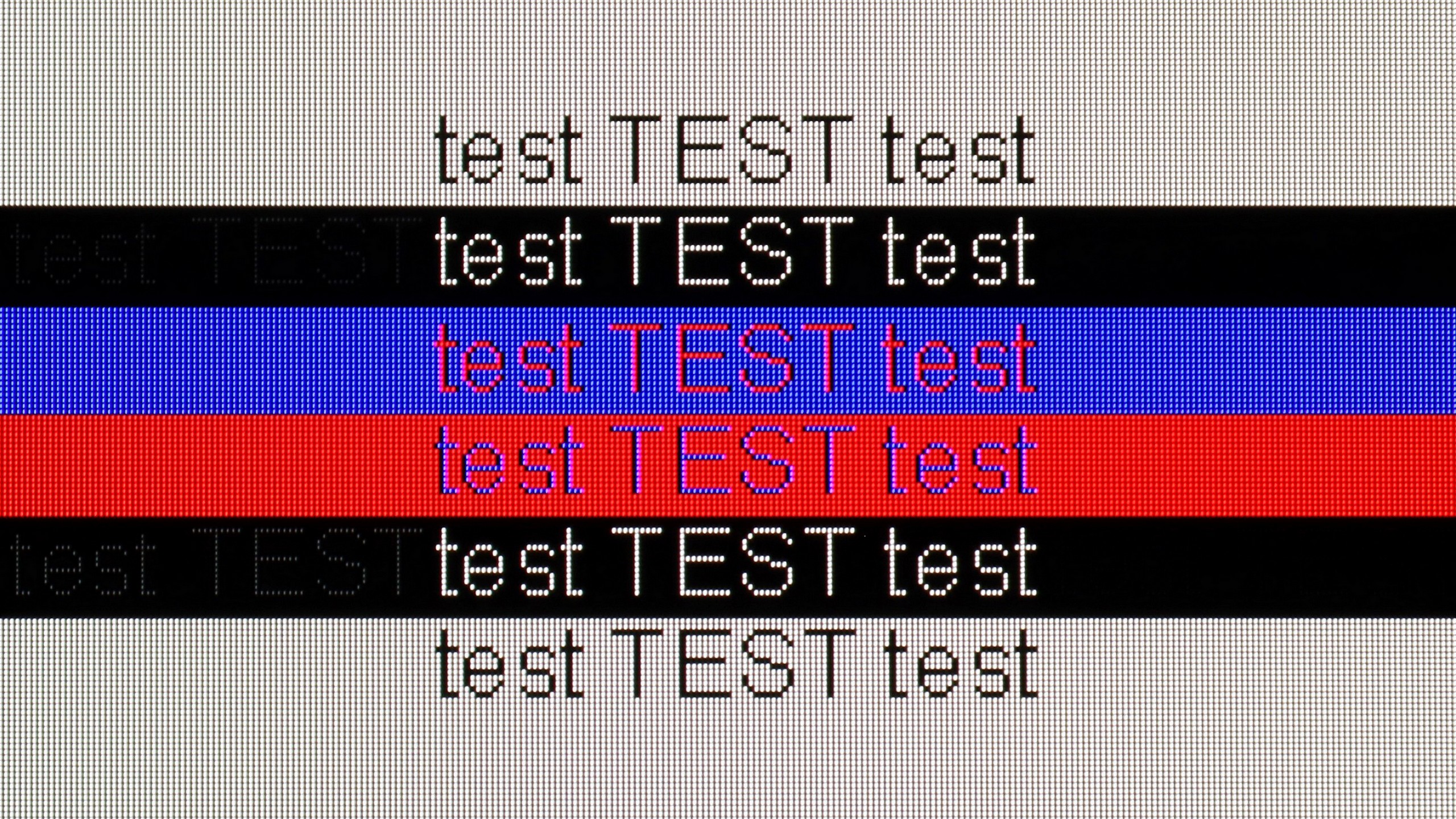
Panasonic Z95A works excellently with computers, offering full chroma 4:4:4 support, which translates to very good font readability. However, one should bear in mind the characteristic way of displaying text of WOLED matrices with a white subpixel, which may be noticeable during prolonged work with documents or browsing websites. This is something worth considering if the television is to be used as a work monitor.
Additionally, the support for G-Sync technology is a plus, which is a great addition for gamers using NVIDIA graphics cards. This means that the Z95A provides smooth gameplay without tearing and delays, making it a versatile device for both work and play.
The S90F is a great tool for both gaming on PC and everyday work. Gamers can rest assured – the television effortlessly supports image synchronisation with NVIDIA graphics cards thanks to G-Sync, and the 144 Hz refresh rate combined with very low input lag only confirms this. The S90F will also serve well as a monitor for text work. Of course, the readability of fonts may be slightly compromised by the characteristic pixel structure in the RWGB layout, but this is a topic well known mainly to those who work with large amounts of text, code, or spreadsheets in Excel. For most users, this will be perfectly acceptable.
Viewing angles
9.7/10
7.4/10
The viewing angles on the Panasonic Z95A are excellent, thanks to the use of an OLED panel with MLA technology. This ensures that the picture remains clear, full of detail, and without visible colour shifts even at large angles. In practice, this means that regardless of where we are watching the television from, the picture quality remains at the highest level.
In this respect, the Z95A ranks among the very best, competing for the title of leader with televisions based on QD-OLED panels (Samsung and Sony). It is difficult to find anything better on the market, making this model an ideal choice for larger rooms or screenings with family and friends, where everyone can enjoy a perfect picture.
The viewing angles on the S90F are very good, although it must be admitted that they are slightly inferior to the 65" version with a QD-OLED panel. Nevertheless, the picture quality at wide angles is excellent – colours remain vivid, and brightness does not drop drastically when viewed from the side. There is no need to move the television towards you to see a clear image. For most users, this level is more than sufficient.
TV efficiency during daytime
6.2/10
6.1/10

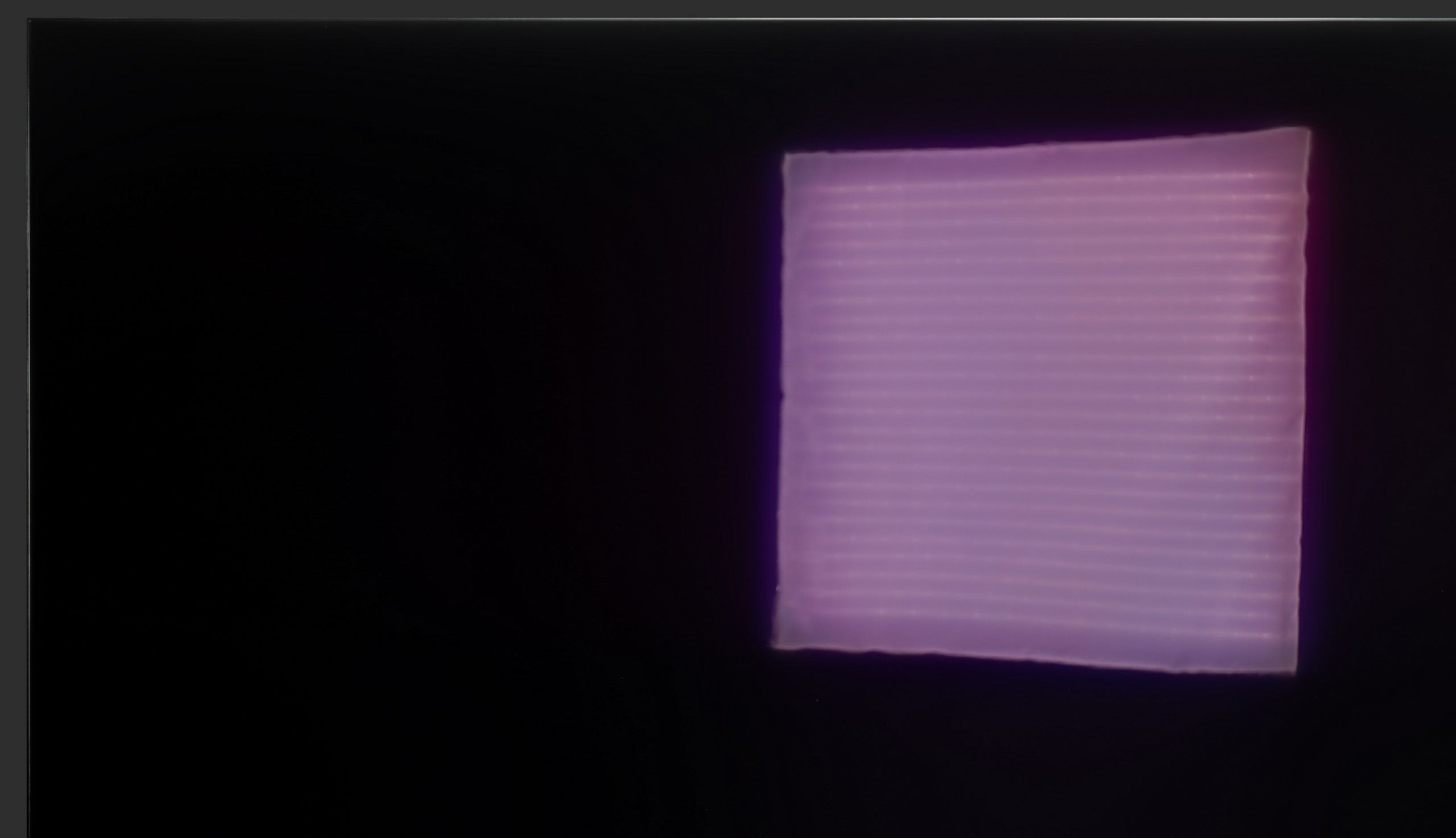


Matrix brightness
Average luminance SDR
SAMSUNG S90F (WOLED): 405 cd/m2
Panasonic Z95A: 493 cd/m2
Panasonic Z95A is equipped with a glossy panel that manages to reduce reflections quite well. However, due to the use of micro lens array (MLA) technology, blacks in bright environments may take on a slightly cherry hue, which is particularly noticeable in brightly lit rooms. In terms of brightness, the average SDR value is around 500 cd/m², which comfortably allows for enjoyable viewing of the television in most living rooms. However, it should be taken into account that in very sunny conditions or with intense artificial lighting, this brightness may prove insufficient to fully eliminate reflections and maintain perfect contrast. Nonetheless, in typical home conditions, Z95A performs very well.
S90F is really a bright television for an OLED. Of course, it is not worth comparing it to Mini-LED televisions or the brightest high-end OLEDs, but under normal lighting conditions, it is quite easy to watch something during the day. The brightness is high enough that you don't need to cover the windows every time you turn on a film or series. However, it is important to remember that the anti-reflective coating on WOLED panels is not among the best. Reflections can be visible, especially with bright light coming in from the window. In such a case, it's best to reach for curtains.
Details about the matrix
Subpixel Structure:

Panel uniformity and thermal imaging:


TV features
7.4/10
7.2/10
- HDMI inputs2 x HDMI 2.0, 2 x HDMI 2.1 48Gbps0 x HDMI 2.0, 4 x HDMI 2.1 48Gbps
- Other inputsToslink (Optical audio), IR (remote)
- OutputsToslink (Optical audio), eARC (HDMI), ARC (HDMI)Toslink (Optical audio), eARC (HDMI), ARC (HDMI)
- Network InterfacesWi-Fi 2.4GHz, Wi-Fi 5GHz, Ethernet (LAN) 100MbpsWi-Fi 2.4GHz, Wi-Fi 5GHz, Ethernet (LAN) 100Mbps
- TV receptionDVB-T, DVB-T2, DVB-S, DVB-S2, DVB-CDVB-T, DVB-T2, DVB-S, DVB-S2, DVB-C
Classic features:
- Recording to USB (terrestrial TV)
- Recording programming
- Picture in Picture (PiP)
- RF remote control (no need to aim at the screen)
- Backlit remote control
- Teletext
- Audio only mode
- Possibility to connect Bluetooth headphones to the TV
- Possibility to simultaneously use Bluetooth headphones and the TV speaker
Smart features:
- AirPlay
- Screen mirroring (Windows Miracast)
- Wyszukiwanie głosowe
- Voice search in native language
- Ability to connect a keyboard and mouse


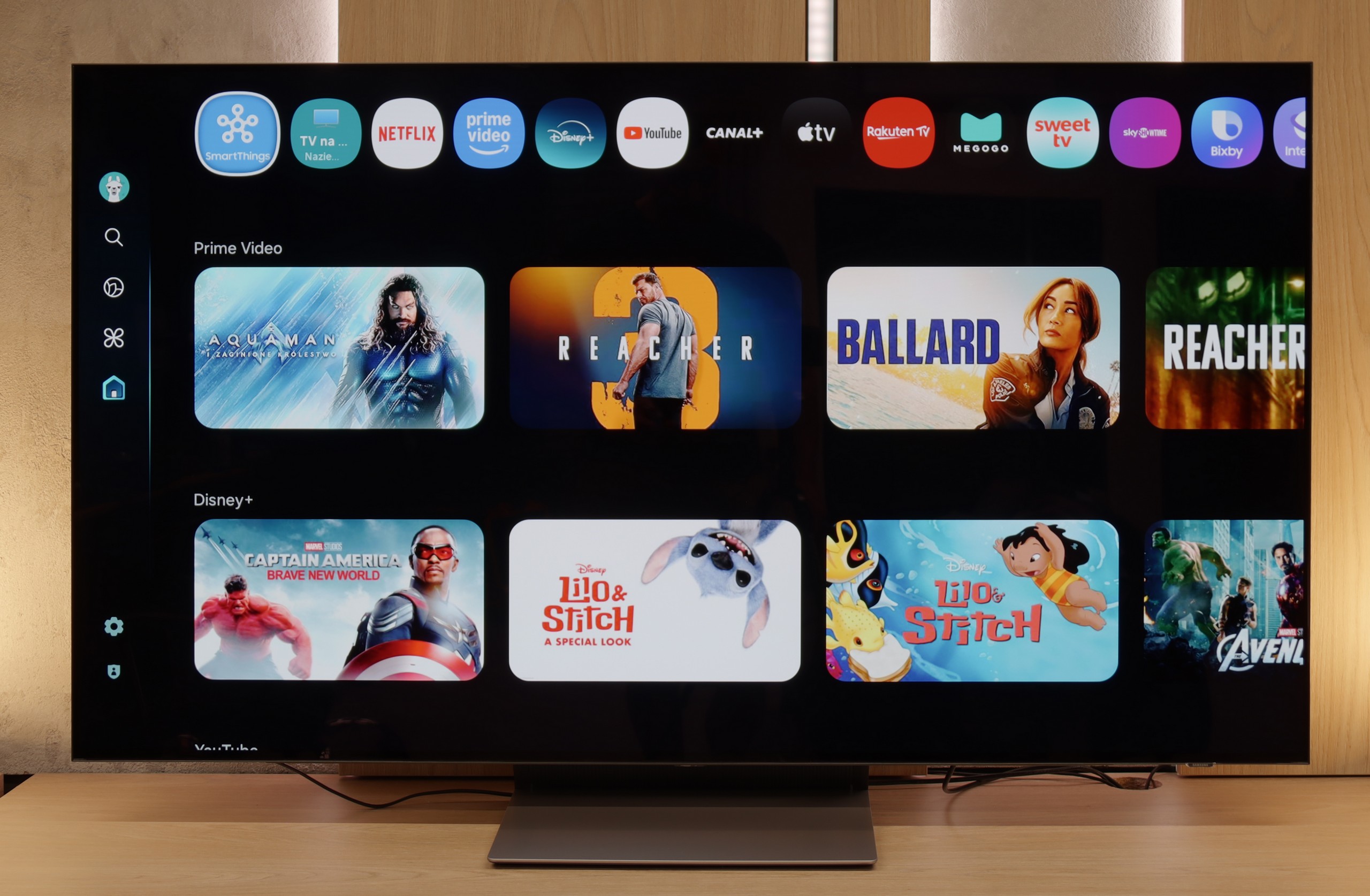
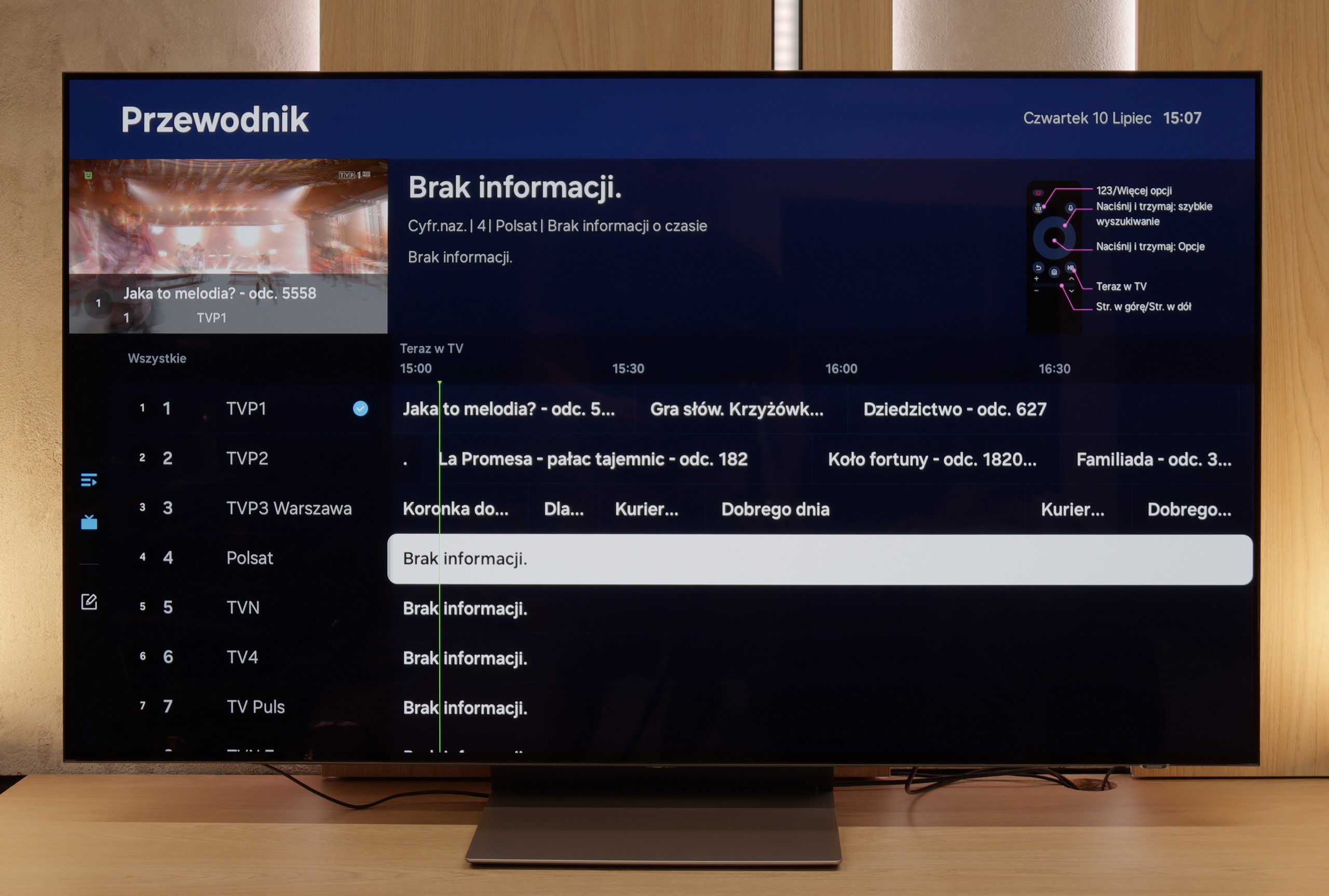
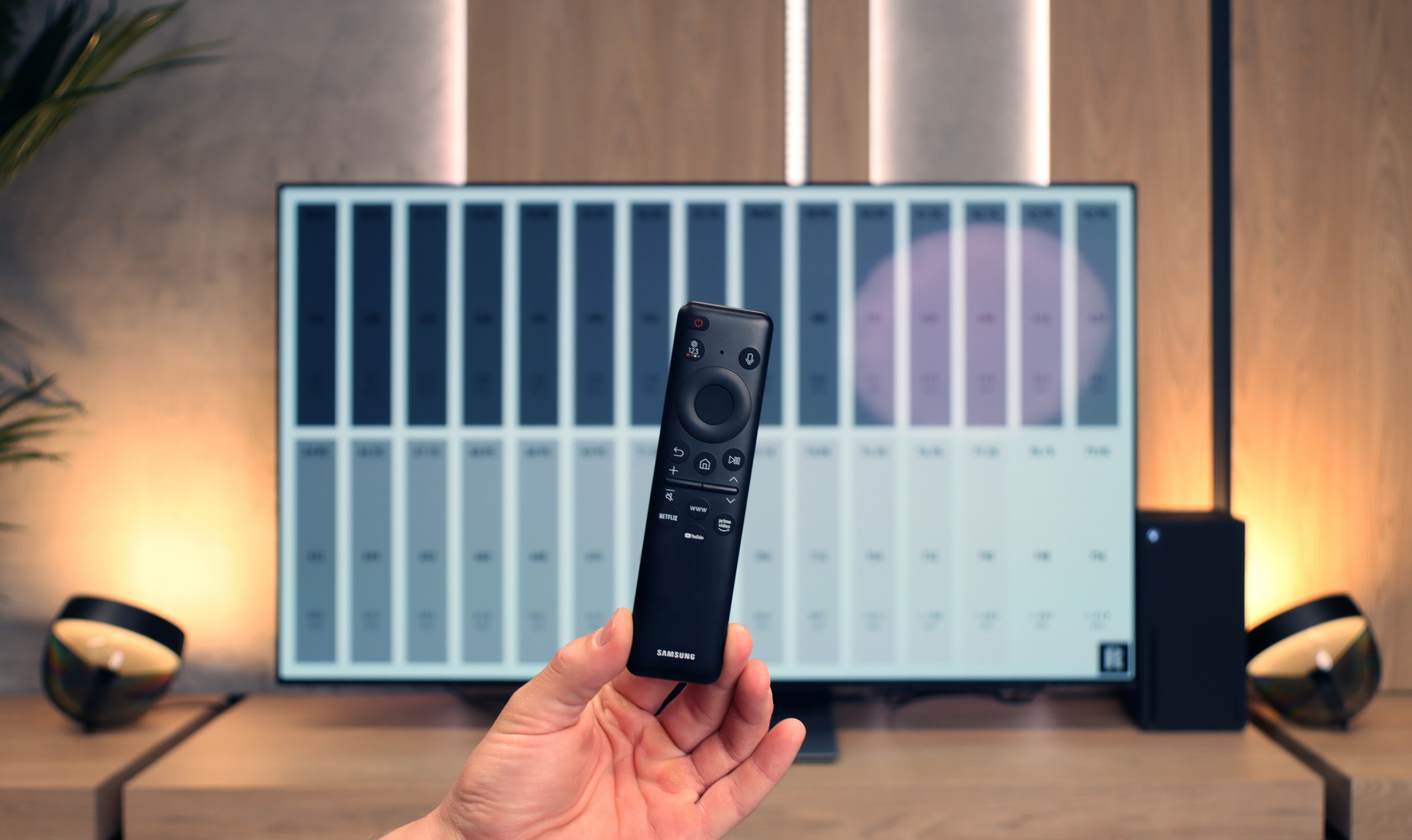
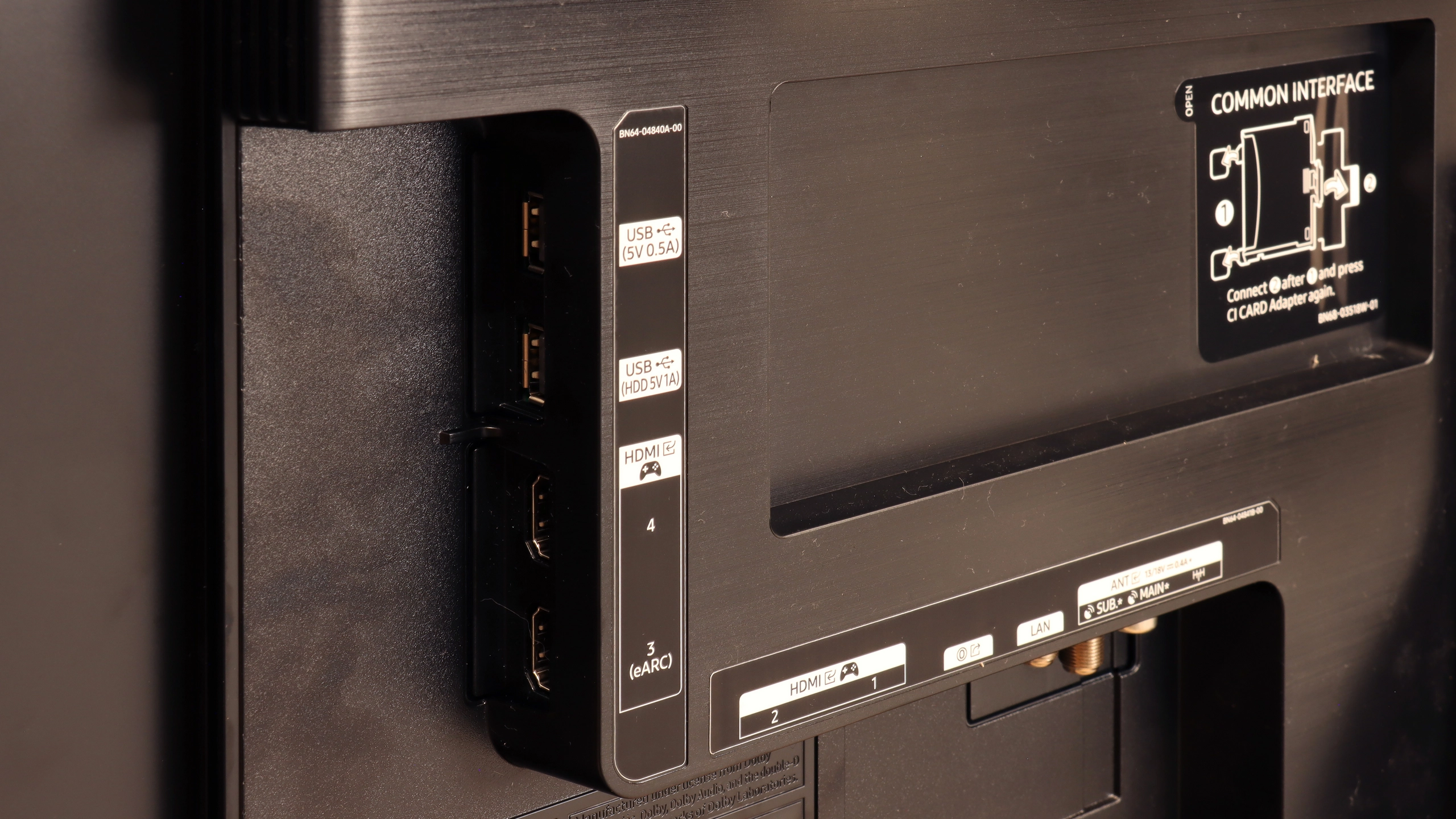
Panasonic Z95A introduces a new operating system, which we believe is a very good move compared to last year's MZ2000 model. The system is called Fire TV and was created by Amazon. It is a novelty in the Polish market, distinguished by its fluidity and responsiveness, providing convenient operation and quick performance in everyday use.
Despite numerous advantages, the system still has a few shortcomings. We won’t find some popular applications on it, such as SkyShowtime, as well as Polish streaming services like Player.pl or TVP VOD. Another drawback is the quality of the interface translation – many functions have been translated in a rather imprecise manner, giving the impression that the translation was done "on the fly". Some names are incomprehensible, especially for those who haven't previously encountered other televisions, which can complicate the use of the device.
In terms of user functions, Z95A performs very well. It includes options such as USB recording, support for the PiP (picture-in-picture) function, AirPlay, and Miracast. As a result, the television offers versatility and meets most of the demands of modern users, although the Fire TV system still requires refinement to fully compete with more established solutions on the market.
The Samsung S90F is equipped with many classic television features, such as EPG, CI module, and headphone support, but there's also more to it. Thanks to the presence of several tuners, the television offers a picture-in-picture (PiP) function – very useful, for example, when we are watching one match but want to take a glance at the score of another one happening simultaneously. It's a shame that Samsung has completely eliminated the USB recording function for some time now, but this is partly compensated by good integration with set-top boxes and other devices. The remote control – although small and lacking a numeric keypad – allows for the control of many devices connected to the television. We can easily operate a set-top box, amplifier, console, or other equipment with it – and all without the need to reach for multiple remotes.
As for the Smart TV system – Tizen on the S90F operates very smoothly, which is not always the case with cheaper models featuring this system. The system itself is comprehensive and offers a lot of functions – we have screen mirroring, AirPlay, Bluetooth device support, as well as many options related to smart home integration, such as controlling light bulbs or other smart devices directly from the television. However, it is important to remember that Tizen is a closed system, so when it comes to apps – we are limited to what we find in the Samsung store. And while this is quite extensive, it does not match the flexibility of the Google TV platform. It's worth keeping this in mind if you have specific needs for niche applications.
Playing files from USB
3.1/10
8/10
Supported photo formats:
Maximum photo resolution:

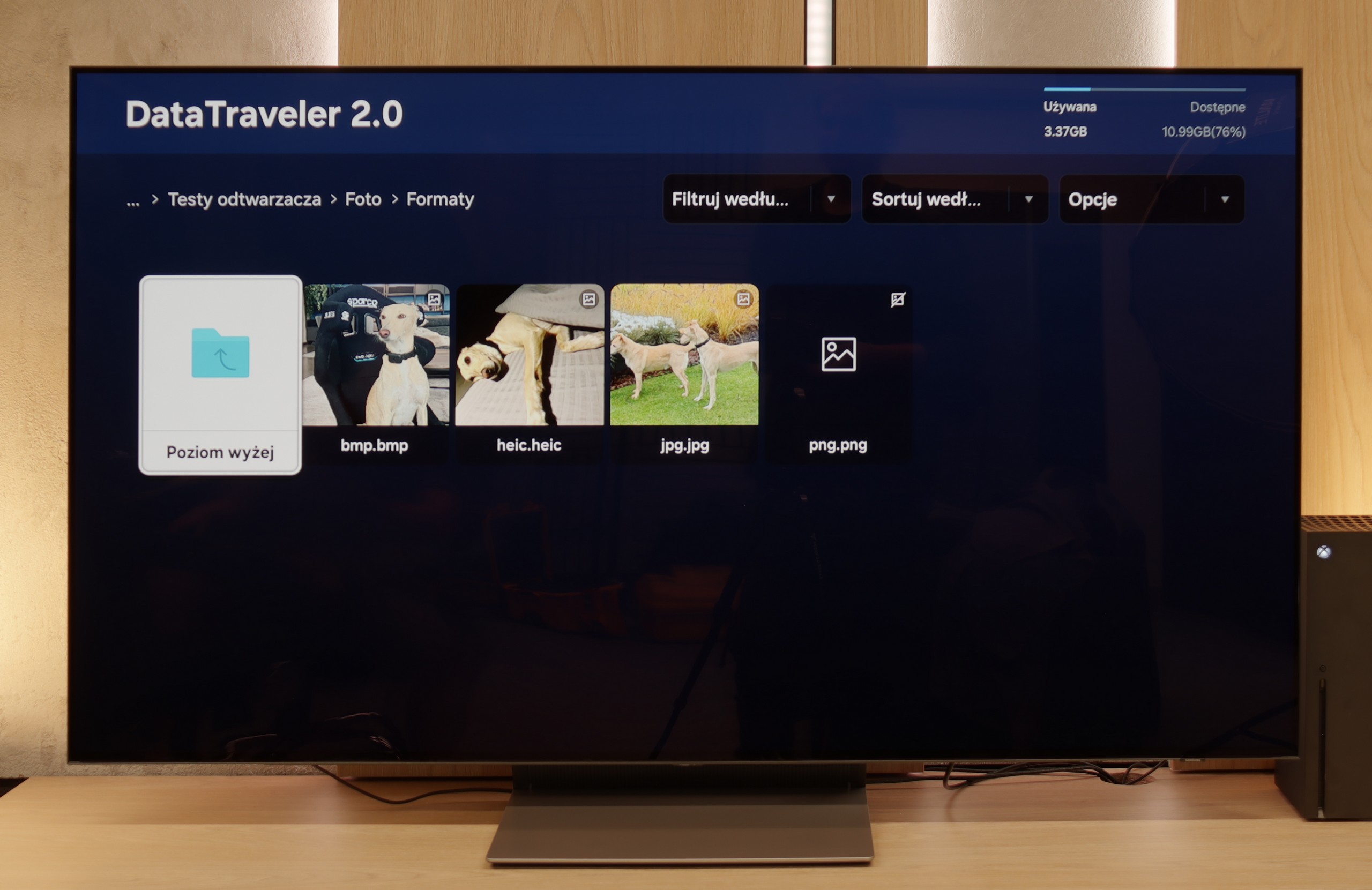
As we mentioned earlier, the Fire TV system in the Panasonic Z95A has some issues with support for the Polish language, which is unfortunately also noticeable when playing files from a USB drive. The built-in media player does not allow for the correct display of Polish characters, such as "ź", "ć" or "ł", which can be inconvenient for users relying on local subtitles for films. If the correct display of Polish characters is important to the user, it may be necessary to use an external application available in the Amazon store or to stream content through other devices.
The built-in media player in the S90F is adequate and supports a fair number of popular formats. Unfortunately, during testing – once again – we encountered issues, despite the manufacturer's claims. The television did not play some formats that are supposedly supported, such as HEIC format photos (the Apple version), or SRT and SUB subtitles. In everyday use for most people, such a player is sufficient to play a movie from a USB drive, but it's worth keeping in mind that surprises may occur. Perhaps the situation will improve in future updates, but at the time of writing this review – it works as it works.
Apps
6.1/10
8.7/10














































Sound
8.7/10
7.4/10
- Maximum volume--
- Dolby Digital Plus 7.1
- Dolby True HD 7.1
- Dolby Atmos in Dolby Digital Plus (JOC)
- Dolby Atmos in Dolby True HD
- DTS:X in DTS-HD MA
- DTS-HD Master Audio
The sound in Panasonic Z95A is one of its strong points, mainly thanks to the built-in soundbar, which provides impressive audio experiences. Dolby Atmos support makes the sound spatial and full of depth, perfectly fitting into the cinematic experience. Both dialogues and sound effects are clear and dynamic, which will satisfy even the most demanding users. Unfortunately, there is a lack of support for the DTS format, which may be disappointing for those using films or content that require it. Nevertheless, the overall sound quality in Z95A is at a very high level and successfully replaces external audio systems (at a reasonable price) in most home applications.
The S90F plays really quite pleasantly, with noticeable bass and quite good dynamics. A definite plus is the support for Dolby Atmos, which allows the television to deliver a slightly more "spatial" sound – of course, to the extent allowed by the built-in 2.1 system 😉. Unfortunately, as is often the case with Samsung, there is a lack of support for the DTS:X format. So, if you want to take advantage of its capabilities, you need to connect the audio equipment directly to the receiver, rather than to the television itself – otherwise, it simply won't work.


